The Truth About Elvis Presley's Manager
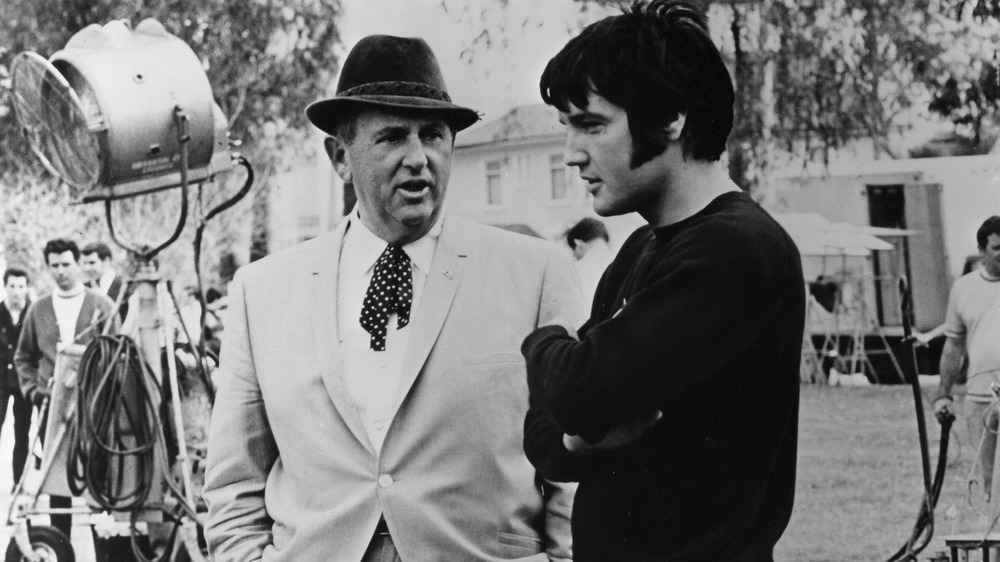
More than 40 years after his death, Elvis Presley remains one of the most famous and most easily recognized people in history. For the entirety of Presley's nearly 25-year career as "The King," his manager, "Colonel" Tom Parker, was the man who made all the career decisions. Frequently photographed with Presley, Parker became a celebrity in his own right, usually pictured chomping on a cigar.
Parker had a reputation for being incredibly protective of his relationship with Presley — and for isolating the singer and encouraging his descent into drug addiction and poor health, a cycle that resulted in Presley's early death at age 42. After incredible success in the 1950s, a period during which Presley came to define the new sound of rock and roll, his popularity plummeted in the 1960s after a stint in the Army and a series of lazy, poorly received films. Perception of Parker shifted, as he seemed to be mismanaging Presley's career into the ground, prioritizing short-term profits over long-term success.
All of that missed the point, however: Parker was an incredibly secretive man who managed to somehow remain mysterious despite spending decades as one of the most famous people in the country. Toward the end of his life, Parker began to lose control of both Elvis Presley's legacy and his own story, however, and today, we know the truth about Elvis Presley's manager.

Elvis' manager was an illegal immigrant
One of the most surprising things about Colonel Tom Parker is that he wasn't an American, he never held American citizenship, and his real name wasn't Tom Parker.
As Biography makes clear, Parker was actually born in the city of Breda in the Netherlands, making him Dutch. His real name was Andreas van Kuijk. When he was still in his teens, Andreas fled the Netherlands by ship, arriving in Canada and making his way to Hoboken, New Jersey. He worked with traveling carnivals and eventually got into music promotion, changing his name to Tom Parker (taking the name from his Army recruitment officer) and erasing any mention of his true origins.
Parker entered the country illegally and never took any steps to correct his status despite the fact that it would have been relatively easy to do so. As Smithsonian Magazine points out, the Alien Registration Act of 1940 basically offered amnesty to all illegal aliens, so becoming a naturalized citizen would have been pretty easy. And even if there were difficulties, by the 1960s , Parker was rich and famous and probably had the connections to get any problems smoothed out. Yet he never bothered and remained an illegal immigrant his entire life.
Elvis' manager totally lied about his past
Andreas Cornelis van Kuijk, aka Colonel Tom Parker, put a lot of effort into hiding his true identity and his past. As Smithsonian Magazine reports, van Kuijk, who was born in the Netherlands, created an elaborate fake past for himself. He claimed to have been born in Huntington, West Virginia. He maintained that his name was Thomas Andrew Parker and was happy to imply that his apparent rank of colonel stemmed from his service in the Army before World War II.
None of this was true. Parker did serve in the Army but only attained the rank of private — as Biography notes, his rank of colonel was ceremonial, bestowed on him by the governor of Louisiana in 1948 as a reward for his efforts on the election campaign.
What's truly remarkable about van Kuijk's deception is how long it lasted. Parker became one of the most famous people in the world, amassed a huge fortune, and negotiated huge deals on Presley's behalf — often making business enemies as he went due to his hard-nosed style. (He once famously quipped that a multimillion-dollar offer was fine for him and then inquired how much Presley would get.) Yet no one ever thought to investigate the Colonel's past. The truth of his life didn't come out until Parker was in his seventies and Presley long dead.
Elvis' manager was diagnosed as a psychopath
Biography tells us that after emigrating illegally to the United States from the Netherlands in the 1920s, Colonel Tom Parker eventually joined the U.S. Army in 1929. He served two years without incident and then re-enlisted in 1931. His second stint in the Army didn't go so well: Smithsonian Magazine reports that he walked off his post and was officially declared "absent without leave" (AWOL) in 1932. He was quickly arrested and spent a few months in military prison.
His stay in prison was harsh (the Army not being known for its leniency toward deserters), and he was kept in solitary confinement for months. This took a mental toll on Parker. As The New York Times notes, Parker was eventually simply discharged from the Army — but only after suffering some sort of "breakdown." The Washington Post reports that he spent several months recuperating at Walter Reed Army Hospital and was officially diagnosed as being in a "Constitutional Psychopathic State" and released from the armed forces that year.
Considering how Parker lied about every aspect of his life, it's certainly possible that his "psychotic state" was a convenient way to escape his service when simply walking away hadn't worked out for him. But it's also possible that the man who managed the most famous singer in rock history was a true psychopath.
Elvis' manager dodged the draft — by eating
When World War II erupted, plunging the whole world into bloody conflict, the U.S. Army needed a lot of men in a very short time, and most people were more than willing to step up and answer the draft. Plenty of men of all ages chose not to wait for the draft and volunteered for service.
As a veteran — even a veteran with a stain on his record — Parker would have been an ideal choice for the draft. But Parker's first experience with the Army had ended with desertion and a his being diagnosed as a psychopath , and this had left him with little apparent desire to repeat the experience, especially if it involved leaving the country and being shot at. As Smithsonian Magazine reports, Parker had apparently had all he could take of Army life and took steps to avoid serving his adopted country. Those steps mostly involved eating.
Even in times of war, the Army has some strict standards about the physical condition of its soldiers, so Parker's brilliant plan to avoid the draft involved gaining weight. Shared.com confirms that Parker's weight program worked perfectly — he soon weighed around 300 pounds, more than enough to be classified morbidly obese and unfit for service.
Elvis' manager was terrified to leave the country
Colonel Tom Parker had swagger. As the manager of the biggest musical star in the world, he could afford to bluster, often bragging about being in charge of Presley's career — and earning the lion's share of the income. But Parker was also a very scared man who sacrificed millions in potential earnings because, as writer Alanna Nash reports, he didn't have a passport and was afraid to let Presley tour overseas without him.
Rare notes that despite being a superstar, Elvis Presley only toured outside the U.S. three times — all in 1957, and all in Canada. And, notably, Parker did not accompany Presley on the trip, fearing being exposed as an illegal immigrant with an assumed name. After that, Parker consistently turned down offers for Presley to tour in Europe and Japan, deals often worth millions of dollars. As The Washington Post notes, British music promoter Harvey Goldsmith said flat out that when he tried to sign Presley to a performance in England, Parker told him privately it would never happen because he was afraid to leave the U.S.
The Washington Post also reminds us that this cost Presley — whose estate was worth just $7 million when he died — a great deal of money. If Parker hadn't been so paranoid about Presley being outside of his direct control, The King would have earned a lot more money.
Elvis' manager let the IRS do his taxes
Elvis' manager was obsessed with money and reveled in the sheer amount of it he could extract from his only client's enormous success. As The Washington Post notes, Parker took home a hefty fee for managing Presley's career. Where normal manager fees were in the 10- to 15- percent range, Presley agreed to a 25-percent fee when he signed with Parker in the 1950s and signed a new agreement in the 1960s that raised his fee to an incredible 50 percent. And throughout the 1960s, Parker forced Presley to appear in a series of truly awful films simply because they made money even as they arguably destroyed Elvis' credibility as a musician.
Most rich people seek ways to lower their tax burden, but despite his greed, Parker never made any move to get creative with his taxes. In fact, as writer Alanna Nash reports, Parker went so far as to actually let the IRS calculate his and Presley's tax debts for him and professed to be happy to pay it.
According Smithsonian Magazine , the reason for this attitude is the same reason Parker refused to travel internationally and why he usually settled lawsuits instead of taking the chance of being forced to testify under oath: He was terrified that his status as an illegal immigrant would be revealed.
Elvis' manager may have been a murderer
One of the biggest mysteries surrounding Colonel Tom Parker is his extreme paranoia and secrecy. It's true he was an illegal immigrant living under an assumed name and therefore had a legitimate reason to worry about any involvement with law enforcement, but as Smithsonian Magazine points out, he could have cleared up his immigration status fairly easily. So why was he so worried about his true identity as Andreas van Kuijk coming out? Possibly because he was a murderer.
As writer Alanna Nash notes, a reporter in Parker's home country of the Netherlands received an anonymous letter stating that he "murdered the wife of a greengrocer on the Bochstraat in Breda." And, in fact, there is an unsolved murder in Bochstraat that fits the timeline of Parker's movements: In 1929, a woman named Anna van den Enden was beaten to death behind her husband's grocery store. The crime scene showed evidence of a search for money and valuables, and an effort had been made to obscure physical evidence.
There's no way to know if the man who would become Elvis' manager was Anna van den Enden's killer. The police investigation uncovered no clues, and it's impossible to place Parker in any specific place in 1929. But it certainly would explain Parker's hurried exit from his home country and his fevered secrecy and worry over his true identity.
Parker used Elvis to fund his gambling and lifestyle
Managing the world's biggest musical act isn't the most difficult job: Elvis Presley was one of the most in-demand artists in the world, and the offers literally came to Colonel Tom Parker no matter what he did. Yet Parker soaked Elvis for an enormous amount of money. As The Washington Post notes, by 1966, Parker was earning 50 percent of Elvis' paychecks, and in 1973, Parker sold the rights to Presley's recording catalog to RCA for a low-ball $5.4 million.
One reason Parker needed all that money was his gambling — and as the Daily Express reports, he may have contributed to Presley's early death by pushing the singer to perform two shows a night, seven days a week, for his Las Vegas residencies in order to keep the cash coming. With Elvis in Las Vegas , Parker ran up enormous debts with the casinos and was focused on keeping Presley working constantly so he could cover his debts.
Elvis' decline during this period is obvious. As Billboard notes, the physical and mental strain drove him to abuse several prescription medications. He gained weight and looked awful, sweating through his rhinestone jumpsuits.
Tom Parker held back Elvis' movie career
Elvis was known for many things: launching rock and roll into the mainstream, scandalizing folks with his hip gyrations, rhinestone-studded jumpsuits — and some really, really awful movies.
Colonel Tom Parker signed Elvis to these terrible films for a simple reason: As The Conversation points out, they made buckets of money — $2.2 billion in domestic gross alone. Add in the soundtrack royalties and the free publicity for Elvis' records, and it's easy to see why Parker ignored his client's pleas for better scripts.
And those better scripts were out there — and offered to Presley. According to The Washington Post , Parker turned down offers for Presley to star in several films that went on to be huge hits and establish their stars as legitimate actors. Elvis could have played the lead in West Side Story , for example, or the role that made Jon Voight a star in Midnight Cowboy . He was also offered the Kris Kristofferson role in the 1976 version of A Star is Born . Parker turned down all these roles because he preferred the safe money and was very protective of Presley's image. But trapping Presley in films of lesser and lesser quality not only frustrated The King but also meant that while rock music was being revolutionized by the Beatles and the Rolling Stones , Elvis Presley was singing songs like " Yoga is as Yoga Does ."
Colonel Tom Parker made more money than Elvis
Elvis Presley was huge. The Daily Express estimated that he earned as much as a billion dollars over the course of his career. As the Los Angeles Times points out, his manager, Colonel Tom Parker, knew that Elvis' brand was so powerful that he could earn millions at any moment simply by booking a tour, recording an album, or appearing in a film. And for every dollar Elvis earned, Tom Parker took a piece.
That's standard. Most managers earn between 10 and 15 percent of what their clients make — but from the very beginning, Parker soaked his only client for more. Their original contract gave Parker an unheard-of 25 percent of Presley's earnings — and he was eventually getting an astounding 50 percent. The new contract also allowed Parker to charge additional fees for services he provided, eating away at the money that should have gone to Elvis instead.
Eventually, this uneven arrangement led to a truly incredible scenario: Elvis Presley's manager made more money than Elvis himself. As The Washington Post notes, in 1973, Parker sold the rights to Presley's recording catalog to RCA for a measly $5.4 million — and earned $1.5 million more than Presley in the deal.
A shocked judge removed Parker from Presley's estate
One inescapable conclusion from even a cursory examination of the way Colonel Tom Parker handled Elvis Presley's career is that the Colonel robbed his client blind over the course of two and a half decades. From his exorbitant 50-percent fee for his services to a multitude of deals where he actually made more money than his client, Parker violated plenty of ethical rules, even if Presley willingly signed the contracts.
After Elvis' death in 1977, however, Parker's hold on Presley's money finally began to slip. As the Los Angeles Times reports, when Priscilla Presley , Elvis' ex-wife, sat down to go over the estate in 1979, she was shocked to discover it was a failing enterprise — revenues had fallen to just $1 million that year and were expected to fall to less than $500,000. Tax bills and other expenses were eating up every dollar The King had left behind, and there were no more tours, records, or films to bring in more cash.
So she did the only sensible thing she could do: She sued Presley's manager, Colonel Tom Parker, in order to sever him from the estate and gain full control — and she won. As The Washington Post reports, the judge in the suit was so shocked by what he saw that he said Parker was "guilty of self-dealing and overreaching" and barred him from any involvement with the estate going forward.
Elvis' manager was finally exposed
Andreas van Kuijk kept up his false identity for decades, but eventually, at least part of the truth caught up with him. As noted by The Washington Post , in 1981, Albert Goldman published a biography of Elvis Presley that was pretty scathing in its portrayal of Parker — and exposed his true identity to the world. At the same time, Parker was being sued by Priscilla Presley, and his dubious financial and ethical behavior toward one of the world's most beloved performers was being detailed.
Parker began to worry that he might be charged with crimes stemming from any number of these misdeeds and suddenly decided that his illegal entry into the United States in the 1920s was a positive instead of a negative. As CMT News reports, in order to slow down any attempt to bring criminal charges against him, Parker officially claimed that he was a citizen of no nation — a man without a country — and thus not subject to any country's laws. His reasoning was that he'd served in the U.S. military without permission from the Dutch government and thus had forfeited his Dutch citizenship. Since he'd never been naturalized as a U.S. citizen, either, he wasn't a subject of either country.
The theory was never tested. Parker died in 1997, 87 years old and having gambled away most of his money.
To revisit this article, visit My Profile, then View saved stories .
- What Is Cinema?
- Newsletters
What Elvis Gets Right—And Wrong—About the Real Colonel Tom Parker
By Alanna Nash

In 1963, Colonel Tom Parker, Elvis Presley’s audacious manager who had gotten his start selling candy apples in carnivals, read in the paper that Franklin Delano Roosevelt’s presidential yacht, the U.S.S. Potomac, was going to be salvaged. Some called it his “Floating White House.” But Parker, who was born in Holland in 1909 as Andreas Cornelis van Kuijk and never became an American citizen, didn’t care about that. He saw the Potomac as just another snow job, as he called his art of the con. He would donate the rusting hulk to charity and put a P.R. feather in the cap of his only client: Elvis Presley.
On February 14, 1964, five days after the Beatles made their debut on The Ed Sullivan Show, Elvis sat at a press conference with the Colonel on the pier at Long Beach, California. With them was actor Danny Thomas, there on behalf of St. Jude, the Memphis research hospital Thomas had founded to help find cures for catastrophic childhood diseases. He graciously accepted the “piece of shit,” as Thomas is said to have called the boat, to sell for cash. As the press cameras clicked away, and the freshly painted Potomac gleamed in the background, the Colonel chuckled to himself. Elvis had paid $55,000 for the thing, but the Colonel, snowman to the core, apparently had only had one side of the old yacht painted—the side that faced the dock. The other remained in its dilapidated state. Why bother to paint both sides? Just present the side you want to show.
In his frenetic, dazzling, exhilarating mess of a movie, Elvis, Baz Luhrmann has done much the same when it comes to Colonel Parker, showing us only one side of a highly complex and intensely fascinating and mysterious character. As someone who knew Colonel Parker and had three, tense, three-hour meetings with him over a two-year span in the ’90s, I admit there were times I felt a chill of evil from him that scared the hell out of me and made me fear for my personal safety, especially during a ride through the Vegas desert. But Luhrmann’s Colonel is straight out of Faust, dripping with the evil of Mephistopheles.
Aside from arguably being the father of American popular culture through the marketing and merchandising of his client, the Colonel negotiated one of the first $1 million-a-picture deals for a Hollywood actor, landed Elvis the highest-paying Vegas contract for the time, and protected the exploitation rights for dead celebrities through his swift actions for the Presley estate in 1977. He also staged the first live international solo concert via satellite with Elvis’s Aloha from Hawaii special in 1973. But in Luhrmann’s treatment, he’s Satan in a snowman sweater. And the bombastic director, as vulgar in his own way as Parker was in his, pays him little respect for his significant business acumen.
Tom Hanks plays this villainy broadly with cartoonish gusto, veering somewhere between Snidely Whiplash and Sydney Greenstreet. Though Austin Butler is a little too pretty as Elvis, and can’t replicate the hypnotic pull of Presley’s exotic good looks, he’s nonetheless a convincing prince from another planet. Hanks, on the other hand, never disappears into the role of Parker. He’s always Tom Hanks, cladded up in a fat suit, prosthetic jowls, and an exaggerated nose drooping from a boiled egg of a face and pate, sometimes resembling his pal LBJ.
Here’s more about what the movie gets right and wrong.
The Colonel’s Real Accent
Hanks gives Parker a pan-European-cum-Nazi accent, but in real life, most people bought his story of hailing from Huntington, West Virginia, a relatively isolated area in the ’50s. His accent, on display in a rare interview with Ted Koppel in the ’80s, sounded more like a slight speech impediment mixed with the insulation of a rural upbringing. He had trouble with the consonants R, which sometimes came out as an L (“Mr. Plesley”), and with J, which he could pronounce as a Y (“you yust missed him”), as evident in the phone call he had with Canadian DJ Red Robinson. What threatened to give away his Dutch heritage was the word “book,” which he delivered with three O’s, rhyming with “fluke.”
Near the end of the film, Elvis learns that Parker is not an American, and doesn’t have a passport, which means Elvis will never fulfill his dream of playing in Europe. That never happened—Elvis died not knowing of Parker’s illegal status—but he would have had to have had a tin ear not to pick up on an accent as obvious as Hanks’s.
The Colonel Was Slyly Funny, but Not Ridiculous
The Colonel had a highly developed sense of humor that enthralled members of Elvis’s entourage as well as actor Hugh O’Brian, whose Wyatt Earp tour Parker promoted in 1957. O’Brian told me that when he asked Parker why he insisted on doing business in cash, the Colonel said, “Because, boy, there ain’t nothin’ like cash! If there was, God would’a named it cash.” He was also fond of saying, “Spend it now—you don’t see any hearses with luggage racks on them.”

By David Canfield

By Maureen Ryan

By Chris Murphy
But in Luhrmann’s film, Hanks plays it hammy and over the top. It works when he issues a rejoinder to Hank Snow, who objects to Elvis’s wiggling, but his funniest line is almost lost in the hustle and bustle of the filming of Elvis’s ’68 comeback special, sponsored by the Singer sewing machine company. Walking down the hall, the Colonel hits up the Singer rep for a free machine for Priscilla: “Mrs. Presley is quite a homemaker, Priscilla is, and I’m sure she would love to have one of the machines so she could knit Elvis [a sweater].”
Elsewhere in this section of the film, Parker—who in real life had sold the network on the idea of a Christmas special so he could turn Elvis into a late-’60s Bing Crosby—appears as a bumbling rube in his insistence that Elvis sing “Here Comes Santa Claus.” It’s funny, but renders Parker ridiculous. Sure, he was out of touch with the times by then, and didn’t see the Phoenix-like potential of what the special could do for his “attraction,” as he called Elvis. But he was never inept, and he was fiercely loyal in his business dealings and determined to honor his contracts to the letter.
The Colonel Goes to Nightmare Alley
In the scenes in which he promotes Hank Snow, Parker talks about staging a carny wedding at an upcoming stop. Parker routinely did this during his days with the carnivals. Remembered Alan Fortas, a member of Elvis’s “Memphis Mafia” entourage: “He performed a wedding ceremony on a Ferris wheel. They had the bride and groom in one car, and the bridesmaids in the next one.” He so identified with that lifestyle that he sought the company of concessionaires, midway operators, and sideshow performers long after his carnival days were over.
While managing Elvis and traveling the country in the late ’50s, the Colonel was accompanied by William Morris agent-in-training Byron Raphael, who remembered, “He often took me to these little carnivals that were so small they didn’t even have a big tent…. In California, between Barstow and Bakersfield, there were billboards every hundred yards, ‘See the Thing! Half Man, Half Animal!’ He took that really seriously. We’d stop and go in there, and it would be very dark, very eerie, and ‘the Thing’ would be this poor pathetic Black person on his hands and knees in a low cage. He had a tail on him, and long hair, and when he would growl, it was really frightening.”
If that grim scenario sounds familiar, the Colonel was also a huge fan of Nightmare Alley, the 1947 drama recently remade by Guillermo del Toro. “The fascination Colonel had with that picture was unbelievable,” Raphael remembered. “He sat there so engrossed that he never moved, though God knows how many times he’d seen it. He talked about it all the time, for years.”
The Colonel Loved Elvis’s Racy Headlines—In Fact He Helped Stage Them
The film has it wrong: Parker likely didn’t blanch when Elvis’s hips summoned the vice squad. The Colonel encouraged anything that grabbed headlines and created controversy for his boy. On October 30, 1957, the day after the second of two Elvis shows at the Pan-Pacific Auditorium, Variety ran the headline, “L.A. Police Order Presley ‘Clean Up’ His Pan-Pac Show.” Hollywood publicist Gene Schwam recently revealed to Variety the story behind the headline: told that the second show wasn’t moving tickets, Schwam, taking a suggestion from Parker, called the police and said he’d heard that Elvis “was getting too risqué for the kids.” Then he told the press what the police said. The second show sold out.
For what it’s worth, the film has it right when Elvis gets suggestive with a plaster Nipper, the RCA dog, in concert. But it’s said to have happened at the Pan-Pacific show.
He Only Took Credit for Elvis’s Success, Not Blame for His Demise
Several times throughout the film, Parker as narrator, says that “you,” meaning the people who loved Elvis, were at the heart of Elvis’s fatal problems. In other words, his loyal subjects killed the king. And it’s true that Parker never seems to have taken any blame. The time he got so mad at me, hammering his cane in the floorboard of his Buick on that ominous ride through the Sin City desert, was when I asked him why he didn’t give Elvis better movie scripts and songs.
“Elvis picked all his own songs and pictures—the scripts were sent directly to his house. The only song I suggested was ‘Are You Lonesome Tonight?’ I got Elvis the most money ever for an entertainer in Las Vegas. People forget that! Nobody! Nobody got more money in the history of Las Vegas!”

The author with the real Colonel Tom Parker, in 1992.
Luhrmann’s Parker is an uncaring man, though the character protests that he’s not. The real Colonel Parker didn’t seem to regard Elvis as a son, even though he apparently cried when Elvis forgot his birthday. Rather, he admitted, “I have to be honest. He was the success I always wanted.”
The last time I saw the Colonel, who peppered his office with stuffed animals—prizes from the carnival—we were back in the Buick, and he and his wife, Loanne, were driving me to my hotel after lunch. It was quiet in the car, and then he spoke.
“We’ve adopted a son, you know.”
I played along. “Oh, yes? A four-footed one?”
“I should say not. Loanne, where’s that picture?”
Loanne dug in her purse and produced a torn picture of a rag street vendor doll, posed with a teddy bear.
“Boy and bear,” Colonel said.
“Very handsome,” I lied. “What’s his name?”
The shock of hearing Colonel Parker say his Dutch name, something he had ferociously protected from the world for 65 years, made me mute.
Finally, he turned to Loanne. “Get your picture back.”
“She’s not going to steal it, Colonel,” Loanne laughed.
But the Colonel trusted no one. He was a carny to the last, even if for one second, unlike with FDR’s old Potomac, he had presented the side he never wanted to show.
Alanna Nash has written four books about Elvis, including The Colonel: The Extraordinary Story of Colonel Tom Parker and Elvis Presley.
More Great Stories From Vanity Fair
Anne Hathaway on Tuning Out the Haters and Embracing Her True Self
Scenes From the Knives-Out Feud Between Barbara Walters and Diane Sawyer
Eddie Redmayne, Liza Minnelli, and the Untold History of Cabaret
Deprived of His 12 Daily Diet Cokes, Trump Falls Asleep (Again) at Trial
While Melania Thinks the Hush Money Trial Is a “Disgrace”: Report
The 25 Best True-Crime Documentaries to Binge Right Now
From the Archive: The Devil in Bette Davis
Stay in the know and subscribe to Vanity Fair for just $2.50 $1 per month.
Alanna Nash

By Brooke Baldwin

By Bess Levin

By Kase Wickman

By Cristian Farias

By Erin Vanderhoof
Colonel Parker Managed Elvis’ Career, but Was He a Killer on the Lam?
The man who brought The King to global fame kept his own past secret. But what exactly was Tom Parker hiding?
/https://tf-cmsv2-smithsonianmag-media.s3.amazonaws.com/accounts/headshot/mike-dash-240.jpg)
The Colonel always was a mystery. But that was very much the way he liked it.
It was, of course, a tough trick to pull off, because the Colonel’s name was Tom Parker, and Tom Parker managed Elvis Presley. Since Elvis was the biggest name in the entertainment industry, his manager could hardly help appearing in the spotlight, too. For the most part that was not a problem, because Parker had showman’s instincts and enjoyed publicity. But, even so, he was always anxious to ensure that attention never settled for very long on two vexed questions: exactly who he was and where he came from.
So far as the wider world knew, the Colonel was Thomas Andrew Parker, born in Huntingdon, West Virginia, some time shortly after 1900. He had toured with carnivals, worked with elephants and managed a palm-reading booth before finding his feet in the early 1950s as a music promoter. Had anyone taken the trouble to inquire, however, they would have discovered that there was no record of the birth of any Thomas Parker in Huntingdon. They might also have discovered that Tom Parker had never held a U.S. passport—and that while he had served in the U.S. Army, he had done so as a private. Indeed, Parker’s brief military career had ended in ignominy. In 1932, he had gone absent without leave and served several months in military prison for desertion. He was released only after he had suffered what his biographer Alanna Nash terms a “psychotic breakdown.” Diagnosed as a psychopath, he was discharged from the Army. A few years later, when the draft was introduced during the World War II, Parker ate until he weighed more than 300 pounds in a successful bid to have himself declared unfit for further service.
For the most part, these details did not emerge until the 1980s, years after Presley’s death and well into the Colonel’s semi-retirement (he eventually died in 1997). But when they did they seemed to explain why, throughout his life, Parker had taken such enormous care to keep his past hidden—why he had settled a lawsuit with Elvis’ record company when it became clear that he would have to face cross-examination under oath, and why, far from resorting to the sort of tax-avoidance schemes that managers typically offered to their clients, he had always let the IRS calculate his taxes. The lack of a passport might even explain the single greatest mystery of Presley’s career: why the Colonel had turned down dozens of offers, totaling millions of dollars, to have his famous client tour the world. Elvis was just as famous in London, Berlin and Tokyo–yet in a career of almost 30 years, he played a total of only three concerts on foreign soil, in Canada in 1957. Although border-crossing formalities were minimal then, the Colonel did not accompany him.
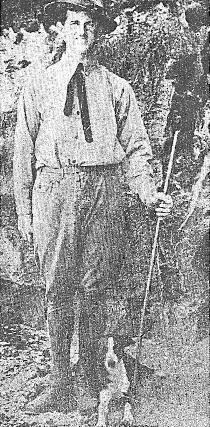
Although it took years for the story to leak out, the mystery of the Colonel’s origins had actually been solved as early as the spring of 1960, in the unlikely surrounds of a hairdressers’ salon in the Dutch town of Eindhoven. There a woman by the name of Nel Dankers-van Kuijk flicked through a copy of Rosita , a Belgian women’s magazine. It carried a story about Presley’s recent discharge from the U.S. Army, illustrated by a photo of the singer standing in the doorway of a train and waving to his fans. The large figure of Elvis’s manager, standing grinning just behind his charge, made Dankers-van Kuijk jump.
The man had aged and grown grotesquely fat. But she still knew him as her long-lost brother.
Far from being born in West Virginia, Tom Parker was in fact a native of the city of Breda, in the southern part of the Netherlands. He had been born there in June 1909, the seventh child of a delivery driver and his wife. His real name was Andreas van Kuijk–”Dries” (pronounced “Drees”) to his family–and as far as anyone could tell, he changed it to Tom Parker because that was the name of the officer who interviewed him when he signed up for the Army. Huntington, West Virginia, meanwhile, was a stop along the route of the carnivals that the Dutch teenager worked when he first came to the States. Parker, or Van Kuijk, had other secrets too. Not the least of them was that he was an illegal immigrant, reaching the United States most probably through Canada. Nor had he ever been naturalized as an American.
The Colonel was largely able to suppress all these unwelcome details; when his overjoyed family sent a brother to the States to see him, the Colonel received him coolly—worried, apparently, that his mother and his siblings might be after money. When brother Ad returned to Breda, moreover, he remained perplexingly silent on the subject of Dries’s glamorous new life. He hadn’t talked much about personal matters, Nash reports, beyond mentioning that he had painted sparrows yellow and sold them as canaries. Some members of the family suspected that Parker had paid him not to talk.
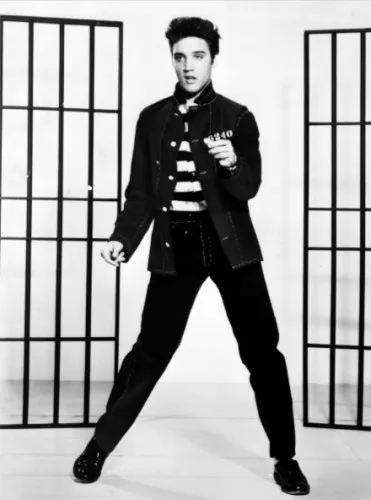
Details of Van Kuijk’s childhood in Breda eventually emerged a few years later, but only in It’s Elvis Time, a small-circulation Dutch fan magazine. From there, they were picked up in the late 1970s by Elvis biographer Albert Goldman . But as late as 1982, the idea that Parker had not been born American was still little more than rumor in the States.
The Colonel’s exposure as an illegal immigrant makes it easier to understand his deep reluctance to leave the States—or even, as he once confided to a trusted assistant, to pick up the check he had earned while working his passage from the Netherlands. But his apparent unwillingness to solve what should have been a minor problem does remain a puzzle. After all, the Alien Registration Act of 1940 had offered an effective amnesty to all illegals, and when Elvis made it big his manager made plenty of powerful new friends. By the 1960s, Parker could have placed a phone call directly to Lyndon Johnson to smooth out any problems with his naturalization.
Only when Elvis died, in 1977, at age 42, did the first hints emerge that something far more unpleasant was lurking in the Colonel’s past, and once again they did so in the Netherlands. There, in Parker’s hometown, a journalist named Dirk Vellenga got a tip–it was “Do you know that Tom Parker comes from Breda? His father was a stableman for van Gend en Loos on the Vlaszak ,” he recalled for Alanna Nash—and set on what would become a 30-year search for the truth about the Colonel.
At first, all Vellenga’s inquiries turned up was old tales from the Van Kuijk family, who still remembered how their Dries had been the family storyteller and liked to dress as a dandy. But his investigation took a much more sinister turn after he received a second tip in 1980.
Vellenga had been filing occasional updates on the Parker story—the Colonel was by far the most famous son of Breda—and found that he was building a detailed picture of what was by any standard a hasty departure. Parker, he learned, had vanished in May 1929 without telling any of his family or friends where he was heading, without taking his identity papers, and without money or even the expensive clothing he had spent most of his wages on. “This means,” notes Nash , that “he set out in a foreign country literally penniless.” In the late 1970s, Vellenga ended one of his newspaper features by posing what seemed to him a reasonable question: “Did something serious happen before Parker left that summer in 1929, or maybe in the 1930s when he broke all contact with his family?”

At least one of his readers thought that question deserved an answer, and a short while later an anonymous letter was delivered to Vellenga’s paper. “Gentlemen,” it began.
At last, I want to say what was told to me 19 years ago about this Colonel Parker. My mother-in-law said to me, if anything comes to light about this Parker, tell them that his name is Van Kuijk and that he murdered the wife of a greengrocer on the Bochstraat…. This murder has never been solved. But look it up and you will discover that he, on that very night, left for America and adopted a different name. And that is why it is so mysterious. That’s why he does not want to be known.
Turning hastily to his newspaper’s files, Vellenga found to his amazement that there had indeed been an unsolved killing in Breda in May 1929. Anna van den Enden, a 23-year-old newlywed, had been battered to death in the living quarters behind her store—a greengrocer’s on the Bochstraat. The premises had then been ransacked, apparently fruitlessly, in a search for money. After that, the killer had scattered a thin layer of pepper around the body before fleeing, apparently in the hope of preventing police dogs from picking up his scent.
The discovery left Vellenga perplexed. The 19 years of silence that his mysterious correspondent mentioned took the story as far back as 1961—exactly the year that the Van Kuijk family had made contract with Parker, and Ad van Kuijk had returned from his visit to the Colonel so remarkably tight-lipped. And the spot where the murder had occurred was only a few yards away from what had been, in 1929, Parker’s family home. Members of the Colonel’s family even recalled that he had been paid to make deliveries for a greengrocer in the area, though they could no longer remember which one.
The evidence, though, remained entirely circumstantial. Not a single witness at the time suggested that Andreas van Kuijk had ever been a suspect. And when Alanna Nash went through the Dutch courts to obtain a copy of the original police report on the murder, she found that nowhere in its 130 handwritten pages was there any mention of the young man who would become the Colonel. The most she could point to were a series of eyewitness statements that suggested the killer had been an unusually well-dressed man, clad in a bright coat—light yellow, always Tom Parker’s favorite color.
The mystery of Anna van den Enden’s death is unlikely to be solved; the original investigation was woefully inadequate, and every one of the witnesses is dead. What remains is the curious coincidence of Parker’s hasty disappearance, the evidence that he was psychopathic—and the testimony of those who knew him as a man of ungovernable temper.
“I really don’t think that there was murder in him,” Todd Slaughter of the Elvis Presley Fan Club of Great Britain told Alanna Nash after knowing Parker for a quarter-century. But others in the Colonel’s circle disagreed. “I don’t think that there’s any doubt he killed that woman,” said Lamar Fike, a member of Elvis Presley’s Memphis Mafia . “He had a terrible temper. He and I got into some violent, violent fights.”
“It took very little to set him off,” added Parker’s assistant, Byron Raphael.
In those fits of rage, he was a very dangerous man, and he certainly appeared capable of killing. He would be nice one second, and stare off like he was lost, and then–boom!–tremendous force. He’d just snap. You never saw it coming. Then five minutes later, he would be so gentle, telling a nice soft story.
Nash and Vellenga have their own version of events, one that they insist best fits the facts. Parker, they suggest, went to van den Enden’s store looking for money to fund his emigration to America. Probably he had known the woman; perhaps he had even desired her—and then been angered by her recent marriage. Either way, what had been meant as the robbery of an empty store had gone wrong, and, in a sudden burst of fear and temper, the Colonel had lashed out and killed a woman without meaning to.
That version doesn’t fully fit the facts; it’s impossible to know now within a week when Parker left the Netherlands, and hence how closely his departure coincided with the Breda murder. And Nash, Vellenga and every other biographer of both Presley and Parker acknowledge that the Colonel never showed much interest in women. He had no children, and he treated his wife as a companion, not as a lover. But, backed by some members of the Van Kuijk family, Nash still believes it more likely than not that Colonel Parker was a killer .
It could have been a coincidence, yes, of course. I cannot say without reservation that he killed this woman. I offer it only as a theory, a possibility. Even his Dutch family is willing to admit that it is a possibility, though they believe, as I do, that if he killed her, it was an accident. I will say that he had an amazing ability to compartmentalize events and feelings in his mind. If something troubled him too much, he was able to store it in a back corner of his consciousness, though he always had trouble keeping it there. Certainly whatever happened in Holland that made him leave his family, with whom he was very close, and to just cut them off, was of a very grave nature. He missed them, but didn’t want to foist his troubles off on them. I know that from a letter he wrote to his nephew in the ’60s after his family identified him from a magazine photo and began to write to him.
Nash sums things up this way: “I want to be clear in saying that there is no hard proof that he committed this murder, in my heart of hearts, I believe he did. Certainly the way he lived his life, for the duration of his years, suggests a secret of that kind of gravity. In other words, if that’s not what happened back in Holland, something equally awful did.”
Sources Dineke Dekkers. “Tom Parker… American or Dutchman?” It’s Elvis Time , April 1967; Alanna Nash. The Colonel: The Extraordinary Story of Colonel Tom Parker and Elvis Presley . London: Aurum 2003; Dirk Vellenga with Mick Farran. Elvis and the Colonel . New York: Delacorte Press, 1988.
Get the latest History stories in your inbox?
Click to visit our Privacy Statement .
/https://tf-cmsv2-smithsonianmag-media.s3.amazonaws.com/accounts/headshot/mike-dash-240.jpg)
Mike Dash | READ MORE
Mike Dash is a contributing writer in history for Smithsonian.com. Before Smithsonian.com, Dash authored the award-winning blog A Blast From the Past.
The Tragic Reason Elvis Never Toured The UK
Baz Luhrmann’s Elvis uncovers why the tale.
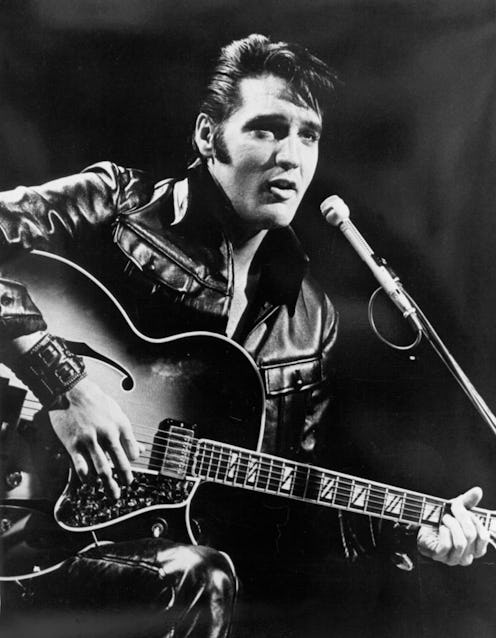
Following a spate of musical biopics in recent years with the releases of Bohemian Rhapsody , Rocketman , Judy , and Respect , Baz Luhrmann released his much-anticipated big-screen interpretation of the life and career of Elvis Presley . Starring Austin Butler as the “King of Rock and Roll” and Tom Hanks as his manager Colonel Tom Parker , Elvis devles into the history of one of the world’s most prolific musicians, who had an army of adoring fans all around the world. But, did Elvis ever tour the UK?
What may come as a surprise to many – given his international fame – Elvis never toured across the pond . As per the Daily Mail , the reason for this lies with his manager, Colonel Tom Parker, who was born in The Netherlands and arrived in the United States as an illegal immigrant. Because Colonel Parker did not possess an American passport, he feared that if he left the U.S. for any reason – including to go on an international tour with Presley – he might not be granted permission back into the United States. Therefore, Parker reportedly convinced the “Blue Suede Shoes” performer that it would be a security risk for him to tour internationally, and encouraged him to focus on the Las Vegas strip, instead.
Although, the singer did briefly visit the United Kingdom back in 1960, when the military plane flying him back to the U.S. from his army service in Europe (which was mandatory at the time) stopped over at Prestwick in Scotland.
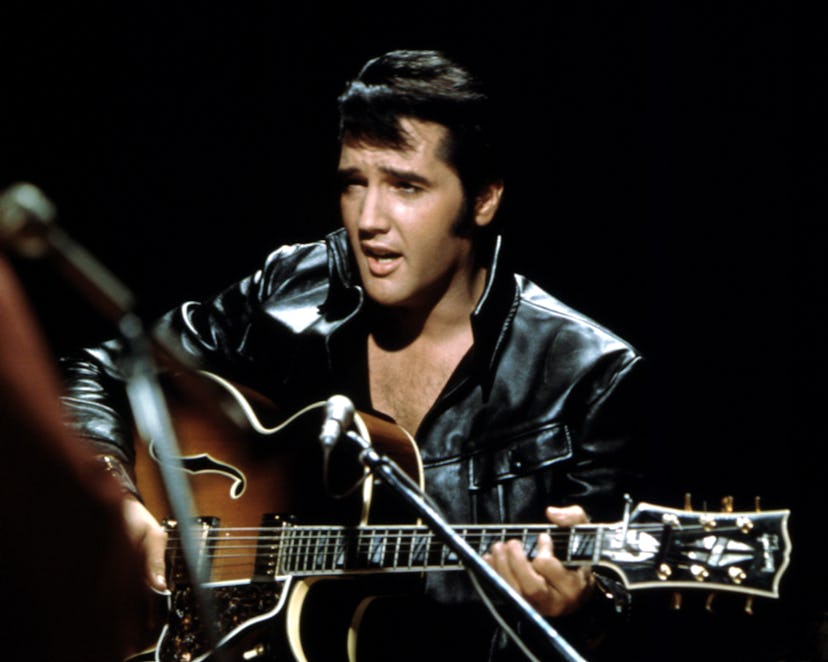
As mentioned, the 2022 musical-biopic Elvis chronicles the life and career of the famed performer, depicting everything from his childhood in Mississippi to his rise to worldwide superstardom. Following the film’s release, critics have largely praised director Luhrmann’s efforts , with one positive review from Rolling Stone describing the big-screen drama as a “brash, overwhelming experience.”
Meanwhile, members of Presley’s own family have also given the biopic their seal of approval . Speaking to reporters, Elvis’ former wife, Priscilla Presley, revealed that she “loves” the film, which she thinks is “beautifully done.”
‘Elvis’ Fact or Fiction: Colonel Tom Parker Biographer on What’s Real and What’s Not in Baz Luhrmann Biopic
By Chris Willman
Chris Willman
Senior Music Writer and Chief Music Critic
- Taylor Swift’s ‘Tortured Poets’ Becomes First Album to Get One Billion Streams on Spotify in a Single Week 2 days ago
- Pink Floyd’s David Gilmour to Release First Album in Nine Years 2 days ago
- Neil Young & Crazy Horse, Pearl Jam to Headline Ohana Festival 2024 2 days ago

Does the phrase “That’s All Right, Mama” apply to the new “ Elvis ” movie… as in, “that’s all correct, ma’am”? No one is probably expecting that ; any practiced watcher of biopics knows virtually any example will take deep liberties with the facts for dramatic purposes. And maybe it’s a given that a director who puts hip-hop and hard rock on his period-film soundtracks, as Baz Luhrmann does, might favor effect over total verisimilitude.
Still, “Elvis” is right on enough counts — literally or spiritually — that it’s worth trying to separate fact from fiction in the movie’s narrative of Elvis Presley (played by Austin Butler) and his nearly career-long manager, Colonel Tom Parker (Tom Hanks). There may be no one better to go to who can provide the truth on both Presley and “the Colonel,” in tandem, than the latter’s biographer, Alanna Nash. Nash, a veteran music journalist, published “The Colonel: The Extraordinary Story of Colonel Tom Parker and Elvis Presley ” to acclaim in 2010 and her book has just been reissued with a new afterword.
The new “Elvis” film is not based on her book, nor did Luhrmann read it, by his account (although he says researchers presented him with notes from that and many other key Presley-related books). But Nash’s work is considered by many to be the authoritative word on Parker, a former carnie who made his fortune off the King, and whose pros and cons as a very, very controlling manager continue to be debated to this day. Variety spoke with her about how much rings true about both of the movie’s primary subjects, point by point.
Popular on Variety
What’s your overall feeling on the movie’s truth-ometer? Are the liberties worth it for creating an artistic picture? Does it veer off in ways that seem unnecessary?
The timeline… well, what timeline? It’s all a Baz Luhrmann fever dream. The past, present and future are all shook up like a ‘50s milkshake and served with a thousand straws! Other than the tremendous pains Baz has taken to make this story seem “woke,” the liberties are essentially fair — except to Parker. In making him such an antagonist, they have robbed him of his many accomplishments with his client.
Is it true, as portrayed, that Parker was consistently trying to pressure Elvis to tone down his sex appeal?
No, no, not at all. Elvis took care of what Elvis did and Colonel took care of what Colonel did. He liked it that Elvis did what brought folks into the big tent. Listen, this guy was no fool! Parker loved it that Elvis was like a male striptease artist… like the bally girls on the carnivals. That sold tickets! The only time Parker got critical is when the shows began to falter with drugs or erratic behavior on stage. But that was in the ’70s.
Was there a late ’50s concert riot in which Elvis deliberately disobeyed Parker’s orders not to move around or wiggle on stage?
There were concert riots, most notably in Jacksonville, Fla., but not a concert for which Parker issued orders like that. No, all that stuff was rehearsed and rehearsed. Colonel knew what Elvis was doing and going to do. And again, he did not advise Elvis on any aspect of his performance. Headlines about how lascivious early Elvis was sold concert tickets. When Parker crony Gabe Tucker threw a magazine piece on the Colonel’s desk that insinuated that Elvis was gay, Parker didn’t say a word until his friend stopped sputtering. “Well,” Parker finally said, “Did they spell his name right?”
Did Parker’s accent really sound like the one Tom Hanks is using in the film?
No. It was more American, more rural. And he had what sounded like a slight lisp or speech impediment. Turns out he didn’t have an impediment — he was just trying to wrap a Dutch tongue around the English language, Southern-style. It sounded like a weird (Southern) regional dialect, and you would know it was Dutch only by listening for certain consonants. But Baz wanted to make him seem more “other.” Or as Baz told me in an interview, “I thought it was very important that Tom present the audience with a strangeness, a sort of ‘What is going on with this guy?’”
Did the Colonel live out his later years being sickly in casinos, as portrayed in the movie’s framing device?
Yes. He was also a consultant to the Hilton, where he gambled every day.
Did Parker really have huge gambling debts he was able to pay off by committing Elvis to a single Vegas hotel for years before Presley’s death?
Yes. Elvis never knew how many shows he played free to satisfy Parker’s enslavement to the roulette wheel and the craps table. In fact, Colonel didn’t even have to go down to the casino. The hotel would bring a roulette wheel to his room. Alex Shoofey, the executive VP of the International, testified that Parker was good for $1 million a year in gambling, but others think that number is low.
Colonel Parker is seen as under pressure from secretive governmental forces who want to keep Elvis from corrupting youth — and to try to get him to tamp down Presley, they threaten to expose his past, as a non-American native of Holland, which he’s desperate to hide. Is there anything to that?
That’s total and unequivocal bunk, a complete invention in the movie. First of all, when Colonel Parker enlisted in the U.S. Army, he declared himself a Dutch citizen, with parents born in Holland. That was fine — we took foreign nationals — but he just had to swear he’d become a U.S. citizen, which he never did, because he went AWOL. But he worked closely with the Pentagon, planning Elvis’ army career and post-army concert to raise money for the U.S.S. Arizona monument.
Is it true that Colonel Parker’s reason for being attracted to Elvis was that he thought a white singer who sounded Black was bound to be a star and accomplish what a Black singer could not?
No. Eddy Arnold, whom Parker had built into a household name, had fired him as his manager over failing to honor their exclusive contract, though Parker continued to book him. The Colonel was now looking for the next big thing. He didn’t care what color he was. My guess is that, if Elvis had been Black, he wouldn’t have been as interested, because it would have been harder to take him to a larger audience, especially in the segregated South, which was Parker’s stronghold from his days on the carnival circuit.
Elvis’s first manager, Bob Neal, told me that he had a heck of a time getting stations to play Elvis’s first single. Country radio stations said Elvis sounded too Black to play, and the stations that played rhythm and blues said he sounded too much like a hillbilly. But a few of them started playing them all the time. The Colonel promoted Elvis’s first big tour with Hank Snow. Once a big crowd saw Elvis perform, there was a demand for his record.
But that gets telescoped in the movie. In the film, when the Colonel goes to the Louisiana Hayride and first sees Elvis, he’s told backstage that Elvis is on the pop charts and that the country DJs are playing him too, and that Black and white kids are buying Elvis’s records. That potential is what interests him. He also says in the film that if he could find an act that gave the audience feelings they weren’t sure they should enjoy, but did, he could create the greatest show on earth. That’s really what he was looking for all along.
Were Elvis’ primary music influences almost all Black artists, as portrayed in the movie?
No, Luhrmann has really framed this through a present-day lens. Elvis had just as many white influences and announced as early as seventh grade that he was going to sing at the Grand Ole Opry. Remember, he entered a talent contest as a child singing “Old Shep” — warbling about dead dogs is about as country as it gets. An early hero in Tupelo was a hillbilly singer named Mississippi Slim. But living in a “colored” neighborhood, as he did, he certainly heard early R&B, jump-blues and swing tunes pulsating through the walls at the nearby juke joints, and he loved it, as he did both Black and white gospel. Still, the odds were heavily in favor that he’d be a country singer and his stint on the Louisiana Hayride seemed to point him in that direction.
Would Elvis have gone to Black Pentecostal tent meetings as a kid, as seen in the film?
He might have gone to Black churches with his friend, Sam Bell, in Tupelo, as a kid. The Black-white divide didn’t mean much to the Presleys. Later, in Memphis, he certainly attended a white fundamentalist church, and — with his early girlfriend, Dixie Locke — the all-Black East Trigg Baptist Church to hear Black gospel. He mentions that church in the film.
He is seen attending so many performances by R&B singers, whether it’s Arthur Big Boy Crudup as a kid or Big Mama Thornton, Sister Rosetta Tharpe, B.B. King and Little Richard later. Is it fantasy that he was constantly seeing or meeting up with all these important artists?
Yes and no. This is Luhrmann showing us Elvis’s influences. Elvis is famously quoted as saying, “Down in Tupelo, Miss., I used to hear old Arthur Crudup bang his box the way I do now and I said, if I ever got to the place I could feel all old Arthur felt, I’d be a music man like nobody saw.” But it’s unclear whether this was on the radio or in person. Teenage Elvis, living in Memphis, certainly went to West Memphis, Arkansas and to Beale Street to hear Black performers. And he continued to go see Black performers, such as Jackie Wilson, throughout his life. He also paid a visit to Little Richard’s home in California in the late ‘50s.
With B.B. King, there was a chance meeting at Sun Studios and, in late 1956, at a famous all-Black charity show, where King was the headliner and Elvis, as an invited guest, came out and wiggled his leg, but did not perform. Backstage, he and King had a photo made. Marty Lacker told me that Elvis and B.B. King used to visit some in Las Vegas, but that was in the ‘70s. He told me: “There were times when B.B. King would be playing in the lounge, and Elvis would be playing in the big room. Elvis would invite B.B. up to the suite after the shows. He liked B.B. and B.B. liked him.”
Elvis’ influences were so diverse. Some people have said the movie undersells Elvis’ country and crooner influences to make him look like almost solely the product of blues and R&B. Any thoughts on that?
I would agree with that. But this is Lurhmann telling us Elvis didn’t steal Black music, as he has been accused of doing, but performed it in homage. I would say it was in his spiritual DNA, as he grew up with Black playmates and heard that music all around him. But Gladys was a big Grand Ole Opry fan, and it was in part the Colonel’s introducing her to Hank Snow that got her to let her boy go with the Colonel. But yes, adolescent Elvis listened to all kinds of music, from the Ink Spots to Dean Martin.
Any thoughts on the portrayal early in the film of country star Hank Snow, who first takes Elvis out on the road before becoming disgusted with him, and his son, Jimmie Rodgers Snow, who seems to worship Elvis?
Snow had a big ego and resented the fact that Elvis quickly became the draw on his shows, not Snow. And his son, Jimmie (later Jimmy), envied Elvis and yearned to counsel him on his “sinful” ways. Elvis kind of liked Jimmie. They went motorcycle riding together in Nashville. Parker used Jimmie to sidle up to Elvis and form a friendship to get Elvis to sign with Parker and the elder Snow, who were then business partners. But then Colonel cheated Hank out of half of Elvis and that was that. Jimmie later went to Graceland in 1958 to talk to him about how he had given up drinking and doing pills on the road and had turned his life over to Jesus. Elvis wasn’t ready for hear all that yet.
What’s the real origin story of Parker hearing about and going to discover Elvis?
He probably initially heard about Elvis from his cronies in Texarkana when Elvis was playing little clubs while on the Louisiana Hayride. What turned Colonel’s head, though, was a report from his old friend Oscar Davis, who went to Memphis in October 1954 to advance an Arnold appearance at Ellis Auditorium, and saw how Elvis packed a local dive, the Eagle’s Nest, night after night with screaming women. Davis went to have a look and went back to tell Colonel Parker all about him and how he wiggled and girls went wild. Charlie Lamb, who was present that day, told me that Parker got up from the lunch table and got in his car that minute and drove to find him.
What about Presley’s entrance into the Army? It’s shown as being Parker’s idea to get him away for a while to put a lid on the sexual energy and image.
Oh, Parker instigated that whole thing, but it wasn’t to put a lid on the sexual energy. He began negotiating it all with the Pentagon in 1956. He wanted Elvis to go not to Special Services, where the army was happy to put him, but to serve his time as any other soldier. This would sand the rough edges off his image and bring him back as the all-American boy fit for family entertainment with Frank Sinatra. It was all to make him into a beloved pop idol, not a dangerous, lugubrious rock ‘n’ roller.
Parker wanted to make Elvis clean-cut after he came back from the army in part because when Elvis went into the army, neither Elvis nor Parker thought rock ‘n’ roll would last. Elvis, especially, thought that it might even be over by the time he got out. So while he was gone (remember, Parker never went to Germany when Elvis was there), Parker set up all these appearances and movies for him, and the idea was to make him appeal to families — the all-American boy that would have longevity, and could grow into that role as he aged. But once Elvis was onstage, controlling the music, he did what he wanted.
It’s kind of like Priscilla letting Baz make Parker out to be such a villain, but is now having Hanks and Baz say they toned down the Colonel’s evilness once they met with her, because Parker was a good guy. They’re having it both ways.
Is the portrayal of the ’68 comeback special accurate, with Parker trying desperately to keep it a Christmas special, and resisting the rock ‘n’ roll throwback elements that everyone loved, because he was kowtowing to a deeply upset TV network?
Yes and no. It was supposed to be a Christmas show in the sense that it would air in December, and Parker wanted it to be a family show with Elvis as a ‘60s-era Bing Crosby or Perry Como. But there was never a Christmas sweater or a fairy-tale Christmas set. That’s Luhrmann being the showman. Parker was ticked that there was initially no Christmas music, though, and (TV producer) Steve Binder and Elvis threw him “Blue Christmas” as a bone.
Is the portrayal of Elvis’ relationship with Priscilla, however briefly that is dramatized, basically accurate?
It’s both sanitized and expanded. After the divorce, Elvis and Priscilla had little shared experience other than arranging Lisa Marie’s visits.
Did Elvis ever really fire Parker on stage, followed by Parker getting back at him by threatening to demand repayment for every tiny expense item over the years?
He never fired him on stage, but there was an incident in Vegas in 1974 where Elvis criticized Barron Hilton from the stage for firing one of Elvis’s favorite employees. That led to a colossal shouting match afterwards with Parker and talk of firing and quitting on both their parts, with Colonel ultimately presenting a bill that the Presleys could not pay. And so things resumed as they had been. Elvis would never have been so crass as to have fired Colonel from the stage.
Did Parker really do everything in his power to make sure Elvis didn’t fulfill his wish of touring internationally?
Yes. Parker had no passport and couldn’t go and didn’t trust any other promoter to take him. He cited several reasons — primarily security — and not big enough venues, or said the money wasn’t right. Near the end of his life, Parker is said to have been speaking with two promoters about this, since Elvis was so deeply unhappy about never getting to go tour Europe, but it never happened.
Did Parker really install Elvis’ dad, Vernon, as business manager to make sure he, the Colonel, could really run all things?
More or less. Vernon needed something to do, and he was always willing to take money under the table, and Parker saw how malleable he was, and would have suggested Vernon be the so-called business manager. Privately, Parker referred to Elvis’s family as “shit” and rubbed his thumb and forefinger together.
Did Parker talk of things in carnival or carnie or conman terms as much as he does in this movie?
Yes, he did. For example, in discussing how he didn’t ever want to get taken advantage of, he’d say, “I don’t want to end up with cider in my ear.” And he had an underling fix up a “cookhouse,” a so-called carnival kitchen, by throwing an oilcloth over the conference room table in his office on the MGM lot. One thing he did with me was to say, “I want you to remember this.” And then he launched into this carny double-speak that sounded kind of like pig Latin. Of course, I had no idea what he was saying, much less remembered it. He never left the carnivals, really.
Anything else to say about the Parker characterization?
The Colonel is a complicated character, and while he always took too much of Presley’s money, he made some very sound decisions for him. Luhrmann hasn’t really given him his due by a long shot.
More From Our Brands
Belinda continues her bélica rebrand with natanael cano collab, martin short just bought a secluded l.a. home, ncaa names nil registry partner after five-year process, be tough on dirt but gentle on your body with the best soaps for sensitive skin, bridgerton designer explains how color theory aided penelope and colin’s season 3 glow-ups, verify it's you, please log in.
Paul Hollins 1am - 4am
Now Playing
Torn Natalie Imbruglia
Elvis Presley
Who was Colonel Tom Parker? Elvis Presley's manager played by Tom Hanks in new film
18 February 2022, 16:45 | Updated: 11 August 2023, 16:59
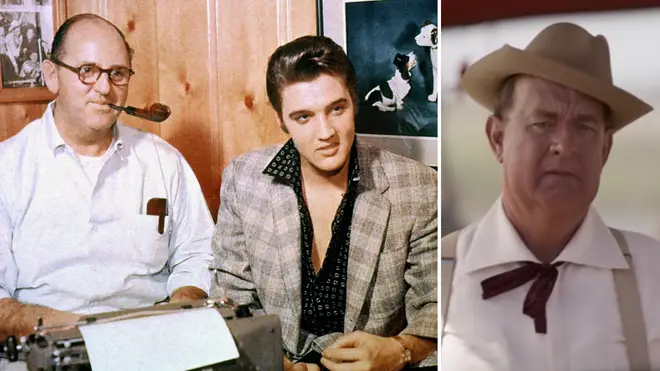
By Tom Eames

Colonel Tom Parker was one of the most important people in Elvis Presley's life, and thus a hugely influential figure in rock history.
The late music mogul is back in the public eye in 2022 thanks to Baz Luhrmann's new Elvis Presley biopic Elvis , with Tom Hanks playing Parker.
But who was the man who managed the biggest rock star on the planet, and what happened to him?
Who was Colonel Tom Parker?
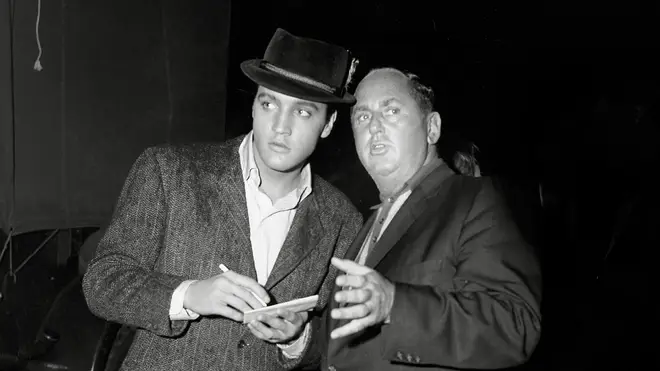
Colonel Tom Parker was a musical entrepreneur who was the manager of Elvis Presley .
Previously a carnival worker, Parker moved into music promotion in 1938, where he worked with popular crooners Gene Austin, and then country singers Eddy Arnold, Hank Snow, and Tommy Sands.
He also helped Jimmie Davis's campaign to become Governor of Louisiana.
Parker discovered the then-unknown Elvis Presley in 1955. He quickly became Presley's sole representative. Within months, Parker had won Elvis a recording contract with RCA Victor.
Elvis soon had his commercial breakthrough in 1956 thanks to first single 'Heartbreak Hotel', and then became one of the most popular and successful entertainers in the world.
Parker received more than half of the income from Elvis's early success, which at the time was an unprecedented figure for a music manager.
The manager negotiated Elvis's expensive merchandising deals, TV appearances, and acting roles, but turned down offers to allow Elvis to tour overseas, potentially due to his status as an illegal immigrant, which would have been exposed.
He was also influential in Presley's decisions to accept military service in 1958, and to marry Priscilla in 1967.
Parker rarely saw him after Elvis's comeback in 1968, but continued in his management role until Presley's death in 1977 .
Where was Colonel Tom Parker from and what was his real name?

Watch the trailer for Elvis
Tom Parker was born Andreas Cornelis van Kuijk on June 26, 1909, in Breda, Netherlands.
He was the seventh of 11 children. Aged 15, Van Kuijk moved to Rotterdam, and two years later he began wanting to run away to the United States to "make his fortune".
He entered America illegally by jumping ship from his employer's vessel. During his first visit there, he travelled with a Chautauqua educational tent show, before returning briefly to the Netherlands.
In The Colonel , a biography of Parker, Alanna Nash claimed that there were questions about a murder in Breda in which Parker may have been a suspect. This may have motivated him to avoid seeking a passport.
In 1929, Andreas returned to the United States aged 20, finding work with carnivals. He enlisted in the United States Army soon after, taking the name 'Tom Parker' from the same name of the officer who interviewed him.
He served for two years in Hawaii and then Florida, but he went AWOL and was charged with desertion. He was punished with solitary confinement, leading to a stint in a mental hospital.
Was Colonel Tom Parker a real Colonel?
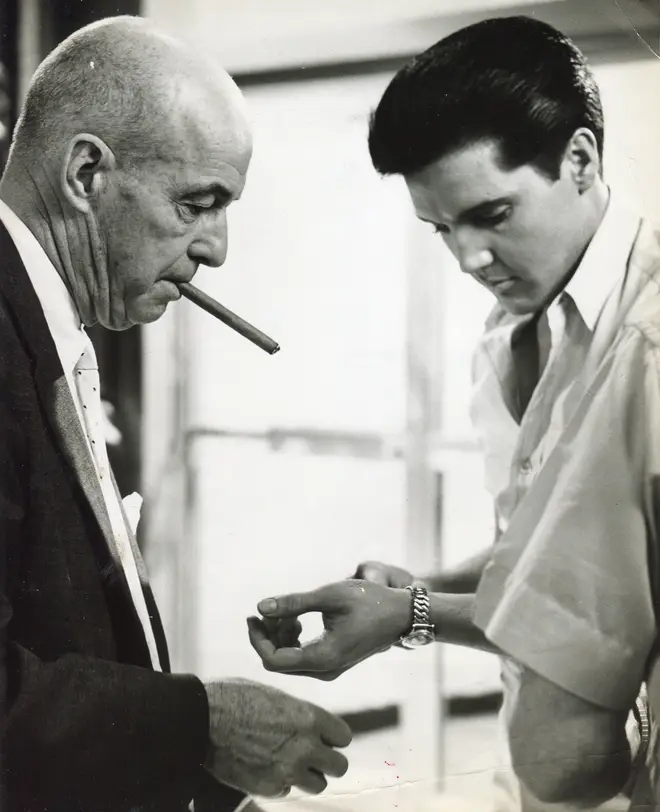
In 1948, Parker received the honorary rank of colonel in the Louisiana State Militia from Jimmie Davis, then-the governor of Louisiana, and a former country singer, in return for the work Parker did on his election campaign.
The rank was just honorary, as Louisiana had no organized militia.
However, Parker used the title for the rest of his life, and became known simply as 'the Colonel'.
Was Colonel Tom Parker married and did he have children?
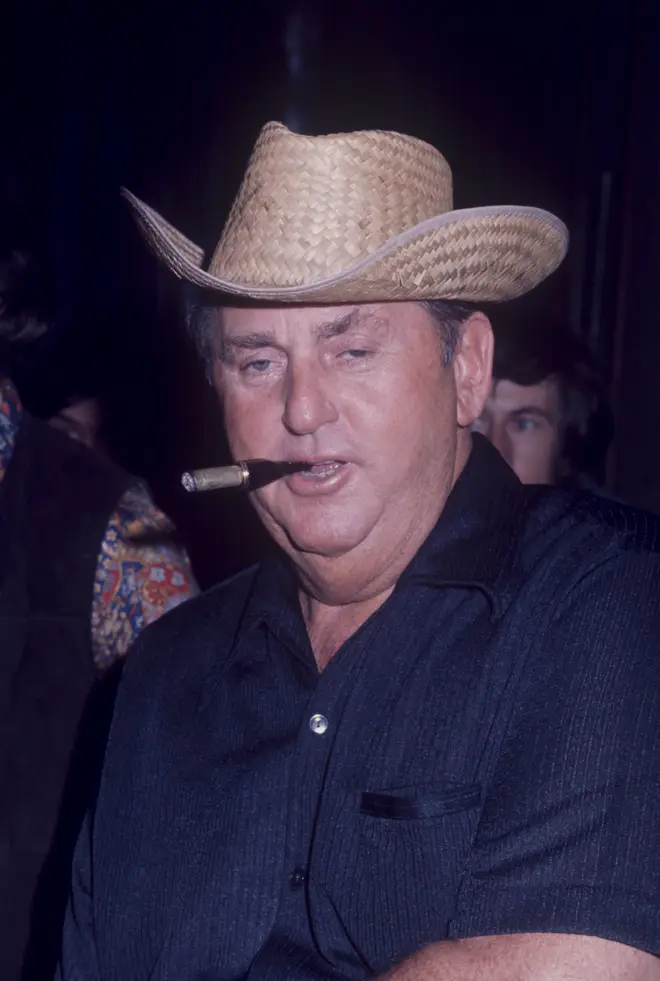
In 1935, while traveling with a circus, Parker met and married 27-year-old Marie Francis Mott.
Marie had been married twice before, and had a son from her first marriage.
Some historians have had doubts as to whether they were legally married at all. Author Alanna Nash has suggested that the couple may have simply placed their hands on a Bible and given themselves a "carny wedding".
During the 1960s, after many years of ill health, Marie started to display signs of dementia. Parker began to distance himself from her, and she died on November 25, 1986, of a chronic brain syndrome at age 78.
In 1990, Parker married Loanne Miller, his secretary since 1972.
When and how did Colonel Tom Parker die?
Parker made his final public appearances in 1994. He had become very sick with diabetes, gout, and other health problems, and barely left his house.
On January 20, 1997, Parker suffered a stroke. He died the following morning at a hospital in Las Vegas, Nevada, aged 87.
His funeral was held at the Hilton Hotel and was attended by Eddy Arnold, Sam Phillips, and Priscilla Presley, who gave a eulogy saying: "Elvis and the Colonel made history together, and the world is richer, better and far more interesting because of their collaboration. And now I need to locate my wallet, because I noticed there was no ticket booth on the way in here, but I'm sure that the Colonel must have arranged for some toll on the way out."
What was Colonel Tom Parker worth when he died?
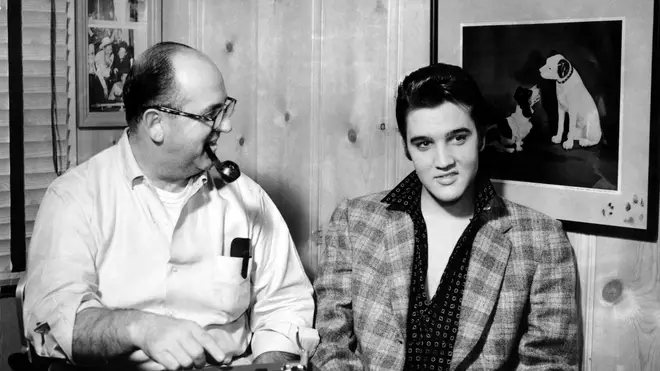
Parker managed the Presley estate for the rest of his life, but he had also sold the rights to Presley's early recordings.
In 1980, a judge ordered an investigation into Parker's management practices, finding that Parker's management had been unethical.
His gambling habit also massively dented his huge fortune, and he died worth only around a million dollars.
More from Elvis Presley
See more More from Elvis Presley
Elvis Presley facts: The King's parents, wife, daughter, films and death explained
Elvis presley's 15 greatest songs ever, ranked, the 50 greatest love songs of all time, ranked, austin butler reveals he had to hire a dialect coach to get rid of elvis presley accent, priscilla presley shares devastating tribute to daughter lisa marie a year on from her tragic death, the poignant song george michael wrote about his heroes john lennon and elvis presley.
George Michael
Latest Music News
See more Latest Music News
The Story of... 'Fix You' by Coldplay
Country star dasha reveals how 'austin' has changed her life - and what inspired it, johnny cash's unreleased early 1990s demos have been discovered for a brand new album, roger taylor slams "narrow-minded" mtv for banning queen videos in unearthed interview, celine dion opens up about stiff person syndrome and poses for stunning magazine shoot.
Celine Dion
Smooth Playlists
Smooth's all time top 500, smooth soul, smooth country hot hits, smooth chill concentration, smooth podcast picks, they don't teach this at school with myleene klass, take that: this life, runpod with jenni falconer, the news agents.
Gold Overnights 12am - 6am
Now Playing
Something In The Air Thunderclap Newman
Elvis Presley
Who was Colonel Tom Parker? The story of Elvis Presley's infamous manager
19 May 2022, 10:44 | Updated: 26 September 2023, 13:17

Watch the trailer for Elvis
By Mayer Nissim

Colonel Tom Parker – the man behind The King – has a life story almost as amazing as Elvis Presley's.
Listen to this article
It's impossible to imagine the history of the 20th century without Elvis Presley , but without Colonel Tom Parker, we may never have even heard of The King.
While Elvis was built from raw talent, it was Colonel Tom Parker who helped make Presley the superstar he became, opening doors and shaping his career.
- 'Always On My Mind' by Elvis Presley: The making of the King's soaring classic
- Elvis Presley's 25 greatest songs ever, ranked
- Gold Hall of Fame Top 300 – including Elvis Presley
To say The Colonel was a controversial figure would be something of an understatement.
From his own mysterious background to his involvement in Elvis's personal life, to his less-than-savoury business methods, Tom Parker has become a shorthand for meddling managers who don't always have the talent's best interest at heart.
He's being played by Tom Hanks in Baz Luhrmann's long, long-awaited Elvis Presley biopic Elvis , and here's everything you need to know about an incredible figure in rock 'n' roll history?
Where did Colonel Tom Parker come from, and what was his real name?

Elvis - That's the Way It Is - Official Trailer
"Colonel Tom Parker" sounds like the name of an old US army vet, and indeed, Tom originally claimed to have been born in Huntington, West Virginia.
The truth came out when some of his long lost family members spotted a photo of him with Elvis in the 1960s – Colonel Tom Parker was actually born Andreas Cornelis (Dries) van Kuijk in Breda, in the Netherlands on June 26, 1909.
He was the seventh of 11 children and his first gig in showbiz came when he was just a lad, doing his bit as a carnival barker.
The tiny city of Breda wasn't going to contain his spirit and ambition, and Van Kuijk moved to the much larger port city of Rotterdam when he was just 15, getting jobs on boats – likely with an eye to making an even bigger escape to an even bigger pond.
When he was 18, he saved up some cash and jumped ship to illegally immigrate into the US. He did briefly go back to the Netherlands, but he returned to the States in 1929 when he was 20.
He enlisted in the US Army soon after, and borrowed the name Tom Parker from the officer who interviewed him, serving his basic training at Fort McPherson in Atlanta, Georgia.
What did Tom Parker do in the US before he managed Elvis and how did he get into the music business?
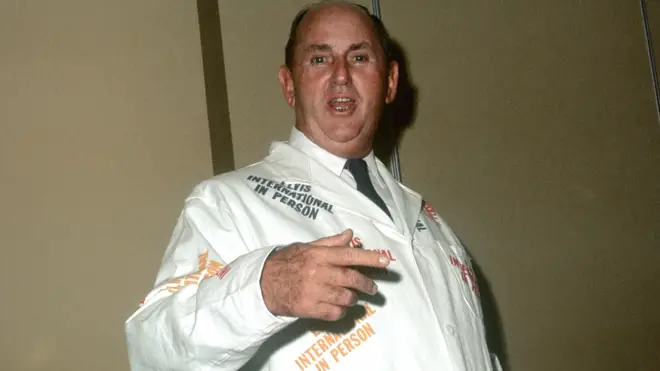
After enlisting, Tom successfully served two years in the 64th Coast Artillery (United States), at Fort Shafter, in Hawaii.
He re-enlisted at Fort Barrancas, Florida, but clearly had second thoughts. Tom went AWOL and was charged with desertion.
He was punished with solitary confinement, leading to psychosis, a stint in a mental health institution and a discharge from the army because of his mental ill-health.
Tom leant on his childhood carnival experience, and in the 1930s worked as a carny with the Royal American Shows till the end of the decade.

Gene Austin - I Hear You Knocking But You Cant Come In (1946)
Parker scraped through the great depression before becoming a music promoter and working with fallen popular singer Gene Austin.
They did well together, but Parker turned down an invitation to move to Nashville, instead staying in Florida – perhaps wary of his immigration status coming to light.
He eventually ended up in Nashville though, when his work for local animal shelter the Hillsborough County Humane Society took him there to find musical acts for the charity, re-sparking his involvement in music promotion.
He became the manager of Eddy Arnold, nabbing 25% of his earnings in the process, before they parted in 1953 after a dispute. Parker also worked with Tommy Sands, but soon everything was about to change.
Was Tom Parker a real Colonel?
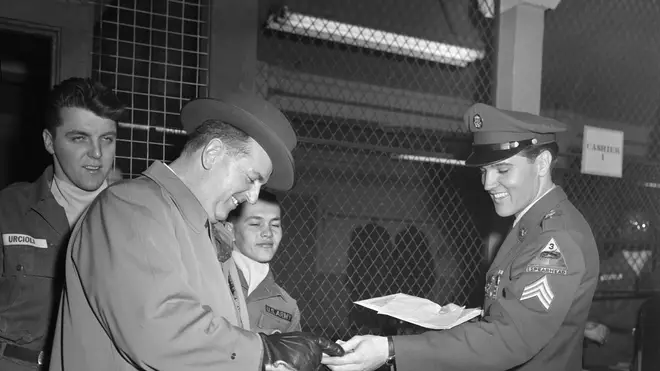
Despite Tom Parker's stint in the US Army, he didn't earn the position of colonel there.
It was in 1948 when he received the honorary rank of colonel in the Louisiana State Militia from former country singer turned major of Louisiana Jimmie Davis , after helping him with his election campaign.
It didn't really matter that Louisiana didn't have a militia. Tom kept hold of that title and used it forevermore, even being nicknamed "The Colonel" by many.
How did Colonel Parker end up managing Elvis Presley?
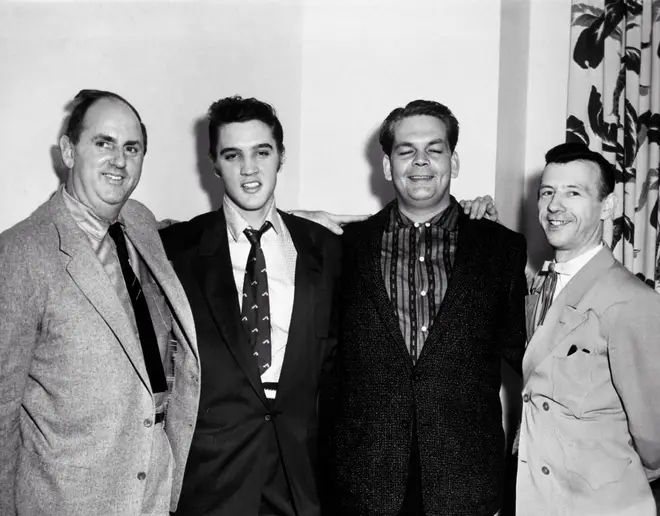
Elvis Presley wasn't a complete unknown when he happened upon Colonel Tom Parker.
Not yet The King, the young Elvis had recorded a handful of singles with Sun: 'That's All Right, 'Good Rockin' Tonight', 'Milkcow Blues Boogie', 'I'm Left, You're Right, She's Gone' and 'I Forgot to Remember to Forget'.
The songs made a splash, with the last topping the country chart, but none made a dent on the Billboard Top 100.
At that time, Elvis was being managed by his guitarist Scotty Moore on the advice of Sun boss Sam Phillips. A year on, Moore was replaced by Memphis radio icon Bob Neal.
The thing was, Elvis was just too big for Bob to cope with, so an interested Parker stepped in to take over some of the responsibilities in February 1955, becoming his special adviser that summer.
Parker felt that Elvis had outgrown Sun, and tried to get him out of his contract and moved to a bigger label.
Phillips insisted on a $40,000 release fee (over $430,000 in today's money), and after some tough negotiations, Parker got that from RCA Victor that November.
Neal got a cut of the deal and agreed to hand over management of Elvis in March 1956 to Colonel Tom Parker.
Did Colonel Tom Parker exploit and "ruin" Elvis Presley?
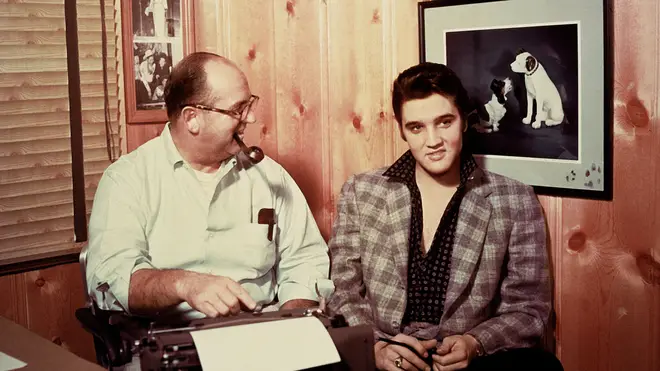
Colonel Tom Parker definitely had a massive, often positive impact on the young Elvis Presley's career.
He was bubbling under, but it was straight after Parker negotiated Elvis a contract with RCA that he scored his first number one single, the groundbreaking 'Heartbreak Hotel'.
Parker got Elvis in everyone's front room when TV was the big new shiny thing, getting him all-important slots on The Milton Berle Show and The Ed Sullivan Show.
The Colonel signed groundbreaking merchandise deals to stick Elvis's name on anything you could imagine, earning tens of millions of dollars for Team Elvis.
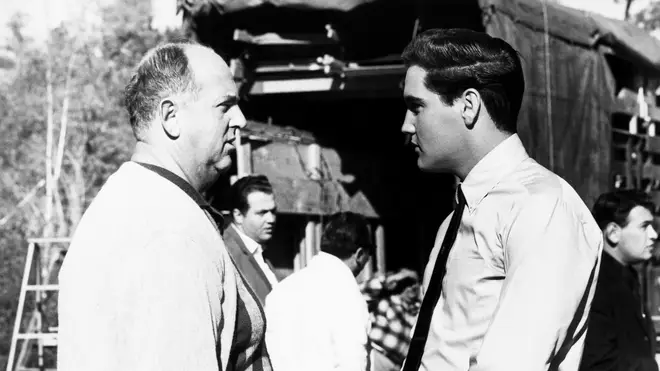
Elvis wanted to be an actor, and it was Parker who got him a screen test at Paramount Pictures, leading to a multi-movie deal, nudging him to sign in his movies and help cement his pop superstardom.
A tough negotiator, he insisted on a $125,000 fee ($1.2 million today) for Elvis to appear on the Welcome Home Elvis episode of The Frank Sinatra Timex Special.
So that was the good...
But while he helped catapult him to the stars, there's a strong argument that Colonel Tom Parker held Elvis back several times during his career.
It feels almost silly to say it, but there's a strong case that Elvis could have been even more successful with better management, or certainly happier, more artistically fulfilled and less exploited.

Elvis wasn't a songwriter, so he was dependent on those who were for his music.
Colonel Tom Parker was wary of the relationship between Presley and songwriters Jerry Leiber and Mike Stoller affecting his vice-like control over The King, and sent Leiber a blank contract to sign in 1958.
"There's no mistake, boy, just sign it and return it", Parker said. "Don't worry, we'll fill it in later."
Leiber, who co-wrote 'Hound Dog', 'Love Me', 'Jailhouse Rock', 'Loving You, 'Don't' and 'King Creole' among others, wasn't having any of it.
Parker tried his luck with other songwriters, and word got around. Not wanting to sacrifice chunks of their hard-earned royalties, some of the best songwriters of the age turned down the chance to write for The King, and reduced the number of incredible songs he would release.

Laurel Goodwin in Elvis movie 'Girls! Girls! Girls!'
As Elvis's career continued, and as Tom Parker's impact on Elvis's career was clearly less positive than the beginning, he began take more and more of his earnings.
He nabbed half of Elvis's earnings from music, films and merchandise by 1967. A third, then half of his touring profit by 1976.
And while the US was the home of rock 'n' roll, for financial and cultural reasons it's a travesty that Elvis never performed outside North America, doing just three 1957 shows in Canada.
The reason for that was likely Colonel Tom Parker not wanting to apply for a US passport, lest his dodgy immigration status and past Army issues come to light.
Parker's background as a carny came to the fore. His management of Elvis seemed to be all about extorting the most money he could as quickly as possible, with little concern for either long-term considerations or artistic merit.
That meant churning out cheap film after cheap film, with rubbish scrips and mediocre songs. Elvis's commercial and critical star waned in the 1960s when he should have been rubbing shoulders with The Beatles and the Rolling Stones.

Interview with Colonel Parker (Elvis Presley's Manager) (1987)
It was because of Tom Parker's bullying negotiation tactics and lack of foresight that Elvis missed out on roles in potentially career-altering movies, from Robert Mitchum's Thunder Road to West Side Story , Midnight Cowboy and Barbra Streisand 's remake of A Star is Born .
Beyond even his career, Parker's meddling in Elvis's life frequently crossed a line.
When Elvis Presley was drafted into the US Army in 1958, Parker wheedled to make sure his client did normal military service, rather than take a celebrity wimp-out.
Whether or not it was the right decision for Elvis, it was a decision that should have been entirely his, without trickery and cajoling from an adult who was supposed to be looking after him.
Similarly, when Elvis eventually married Priscilla Beaulieu in 1967, Parker was behind the scenes once more, advocating for the marriage as a way of "taming" Elvis's mutterings of rebellion against his overbearing manager.

Watch the trailer for Baz Luhrmann film 'Elvis'
Parker also sold the rights Elvis's early recordings, though given how little was known about the future prospects of music rights it would have been more understandable back then than it seems today.
Mistakes and inexperience weren't uncommon failings for pop managers still working in a new form of entertainment. Just look at Brian Epstein's issues with The Beatles' finances.
The bigger issue is that whopping 50% that Parker skimmed off of everything Elvis earned, even after his death, compared to the standard 10-15% a manager usually took.
A journalist once took Parker to task on this, asking: “Is it true that you take 50% of everything Elvis earns?" Parker's incredible response was" "That’s not true at all. He takes 50% of everything I earn."
Parker continued to be Elvis's manager through the 1970s until The King's death in 1977, but he didn't see much of Presley in his later years.
After Elvis died, the probate judge appointed a Memphis lawyer Blanchard Tual, whose report accused the Colonel of "self-dealing and overreaching” and of having "violated his duty to Elvis and the estate".
In the final reckoning, it's hard to argue with that.
Was Colonel Tom Parker a murderer?

COLONEL TOM PARKER - Interview on "ABC Nightline" (Aug 15, 1987)
Tom Parker's desire to keep his immigration status under wraps and reluctance to leave the US is understandable.
But there's been some confusion as to why he didn't take advantage of the amnesty offered by the Alien Registration Act of 1940, or after that why he didn't lean on The King's famous friends (which included more than one US president) to make him a legal US citizen.
One somewhat out-there theory is that the young Andreas Cornelis van Kuijk didn't leave Breda just in search of fortune, glory and adventure, but because he was on the run.
Louisville-born journalist Alanna Nash, said to be the first journalist to see Elvis Presley in his casket, wrote The Colonel: The Extraordinary Story of Colonel Tom Parker and Elvis Presley in 2003, which contained a startling claim.
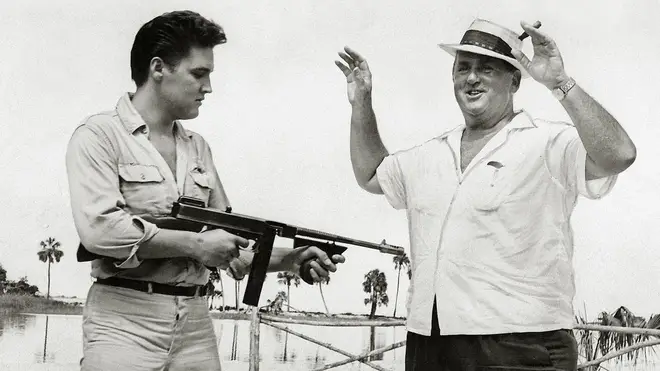
In May 1929, 23-year-old newlywed Anna van den Enden was bludgeoned to death in Breda.
"His family told me that he left quite abruptly, without taking any identifying papers, any money, or any clothing," Nash told Elvis Australia about van Kuijk's swift departure from Breda soon after the murder.
"Obviously, he was terrified of some kind of discovery. This means he set out in a foreign country literally penniless."
She added: "It could have been a coincidence, yes, of course. I cannot say without reservation that he killed this woman.
"I offer it only as a theory, a possibility. Even his Dutch family is willing to admit that it is a possibility, though they believe, as I do, that if he killed her, it was an accident."
So the evidence is only circumstantial, and without something more definitive emerging we're going to hesitate to call the Colonel a killer.
Did Colonel Tom Parker get married or have any children?

"He Was Both A Genius And A Scoundrel" - Tom Hanks On Portraying Elvis' Manager, Colonel Tom Parker
Tom Parker met and married the 27-year-old Marie Francis Mott in 1935.
It's been suggested (by Nash once more) that the wedding may not have been entirely legal, and that they could have had a homebrew carny wedding by swearing their love on a bible.
The couple began to drift in the 1960s as Marie struggled with dementia. She died on November 25, 1986 of a chronic brain syndrome. She was 78.
Parker got wed for a second time in 1990, marrying Lorraine Miller, who had been his secretary since 1972.
The Colonel didn't have any children of his own, though Marie had a son from a previous marriage.
When and how did Colonel Tom Parker die?
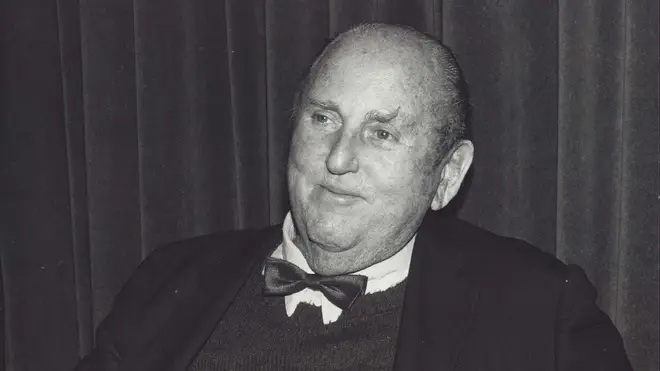
Into his late 80s, Colonel Tom Parker began to struggle with various illnesses including diabetes and gout.
On January 20, 1997, Parker suffered a stroke, and died the following morning in a Las Vegas hospital. He was 87.
Held at a Hilton Hotel, his funeral was attended by the likes of Sun Records boss Sam Phillips and Parker's former client Eddy Arnold.
"Elvis and the Colonel made history together, and the world is richer, better and far more interesting because of their collaboration," said Priscilla Presley at the funeral, repping the Elvis estate.
"And now I need to locate my wallet, because I noticed there was no ticket booth on the way in here, but I'm sure that the Colonel must have arranged for some toll on the way out."
More from Elvis Presley
See more More from Elvis Presley
Elvis Presley facts: The King of Rock and Roll's songs, films, marriage, children, and tragic death
Hall Of Fame
The heartbreaking reason why Elvis Presley turned down Barbra Streisand's 'A Star Is Born'
Rita moreno looks back on her fling with elvis presley: "he liked what he saw", how kurt russell made his film debut by kicking elvis presley, and later played the king himself, engelbert humperdinck reveals how "brother" elvis presley stole his trademark style, the 15 best love songs of the 1950s, ranked, latest music news.
See more Latest Music News

Mike Pinder, founding member of The Moody Blues, dies aged 82
13 massive hit singles that were originally b-sides, pink floyd's david gilmour announces his first album of new songs in nearly a decade, when the beach boys went rock ‘n’ roll with crazed cover of chuck berry’s 'johnny b goode'.
The Beach Boys
Marvin Gaye's 15 greatest songs, ranked
More artists.
See more More Artists
The Beatles
David bowie, stevie wonder, more from gold, wings' long-lost album including beatles classics is finally getting a release after 50 years.
Paul McCartney
Jon Bon Jovi reveals the story behind Livin' on a Prayer: "We didn't always have a key change"
When status quo helped manchester united score a number one hit with 'come on you reds', 10cc's graham gouldman announces new album featuring ringo starr, brian may and hank marvin, cher is finally going to be inducted into the rock and roll hall of fame, lulu's hall of fame: pop legend looks back on her biggest songs.
- Craft and Criticism
- Fiction and Poetry
- News and Culture
- Lit Hub Radio
- Reading Lists

- Literary Criticism
- Craft and Advice
- In Conversation
- On Translation
- Short Story
- From the Novel
- Bookstores and Libraries
- Film and TV
- Art and Photography
- Freeman’s
- The Virtual Book Channel
- Behind the Mic
- Beyond the Page
- The Cosmic Library
- The Critic and Her Publics
- Emergence Magazine
- Fiction/Non/Fiction
- First Draft: A Dialogue on Writing
- Future Fables
- The History of Literature
- I’m a Writer But
- Just the Right Book
- Lit Century
- The Literary Life with Mitchell Kaplan
- New Books Network
- Tor Presents: Voyage Into Genre
- Windham-Campbell Prizes Podcast
- Write-minded
- The Best of the Decade
- Best Reviewed Books
- BookMarks Daily Giveaway
- The Daily Thrill
- CrimeReads Daily Giveaway
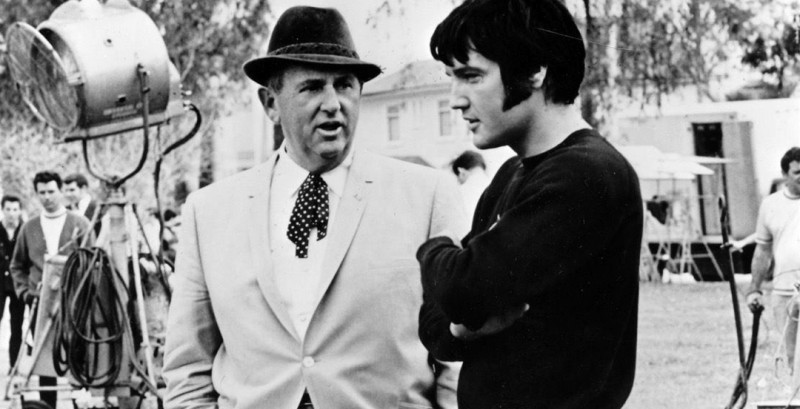
How Elvis Presley and Colonel Tom Parker Made Music History Together
Greg mcdonald and marshall terrill on the fraught yet successful partnership of two industry titans.
In late February 1972, President Richard Nixon made a historic trip to China in an effort to ease long-term tensions and hostilities after years of diplomatic isolation. Not only did this visit strengthen Chinese-American relations, but it also served to encourage progress with the USSR.
I was driving Colonel Parker from Los Angeles to Palm Springs as we listened to a radio broadcast of this event, live via satellite from China. The Colonel’s mind went into overdrive as he learned about this new technology, which would allow people to hear and see someone around the world on radio and television. He blurted the first thing that came to his mind.
“What a great way for people everywhere to see and hear Elvis!” he said.
He knew a show by satellite could make entertainment history and Elvis was the perfect worldwide star to pull it off.
But how do you achieve something that has never been done before? I have been around lots of wealthy and influential people. Many of them come up with great ideas such as these, but 99.9 percent of them never get off the drawing board. If they do, there is a team of people doing the nuts and bolts to pull it off. Colonel Parker was a one-man show. He was among that .01 percent who worked tirelessly to realize his vision. This idea, he felt, could be very big… but it would need some more thought.
The world was changing, and so was Elvis. Elvis and Priscilla were separated and talk of a divorce was making headlines everywhere. He had been living under the age-old male belief that the husband could play around, but the wife was to stay home and remain faithful and raise their child. Despite Elvis’s infidelities, Priscilla had remained faithful for years. She’d finally had enough and told Elvis she was leaving him. He did not take it well, but he was about to meet the wonderful Linda Thompson, who was his main girlfriend for the next four years. Linda and I are friends to this day. Linda’s brother, Sam, had worked as a sheriff’s deputy before he became Elvis’s bodyguard in July 1976. Sam was a trusted friend of Elvis’s, and the two men spent hours singing gospel songs together on tour.
After Elvis’s passing, Sam attended law school and became a very successful lawyer and judge. Later he became a member of the Nevada Transmission Authority and the Public Utilities Commission. Sam was also a warden of a prison for a spell, which is ironic because he’s the sweetest guy in the world. He and his wife, Louise, are close friends of mine, and we stay in touch and travel together to Elvis-related events. After his legal career, Sam started a record label with music impresario David Foster, which they later sold to Warner Music. Linda and Sam were two of the few people in Elvis’s inner circle who did not do drugs and tried to help Elvis with his addiction. Sam believes, despite all of Elvis’s success, deep down he remained humble if not a bit insecure.
“Elvis used to sit up nights and wonder why he had become the King and someone else had not—someone like Jerry Lee. He really did ponder on this issue cosmically: ‘Why me?’” Sam said. “He knew he was talented, and he was good looking, and at the right place at the right time. But there were a lot of others out there too. He truly felt humbled by that. He never truly came to grips with it.”
The relationship between Colonel Parker and Management III Productions was growing strained. The Colonel was aware that Weintraub was using his power with the Elvis tour to promote his own artist, John Denver. The Colonel insisted that no other artist ever ride on Elvis’s coattails, and Jerry was really pushing the boundaries. The Colonel often spotted Weintraub stepping outside the offices and conducting business that had nothing to do with Elvis. Weintraub also invited other artists he was trying to sign to Elvis’s concerts to show off his relationship with the star.
In the world of show business, what Weintraub was doing was an accepted practice, but that did not fly with the Colonel. He was growing more agitated with the situation and Weintraub’s swelling ego.
When on tour, Jerry was often on the phone handling his personal affairs and not taking care of business. When their private jet was ready to leave, they’d have to wait while someone ran to get Jerry off the airport phone. The Colonel was also getting reports that Jerry was difficult. The Colonel waited until the tour was over to make his move.
The contract for Elvis’s winter tour in November was signed on September 12, listing only three names: Elvis, the Colonel, and RCA Records. Management III Productions was not going to be involved.
With his load lightened, the Colonel was free to think. And he was thinking a lot about turning the satellite idea into reality. He contacted NBC president Tom Sarnoff about selling the show to countries all over the world, and Sarnoff got it done. The eventual tally was thirty-eight countries plus the British protectorate of Hong Kong. The special was not broadcast in Russia, China, Africa, South America, the Middle East, or South Asia.
Parker and Sarnoff set a tentative concert date for November 18 at the end of Presley’s winter tour, but it was scrapped at the request of MGM president Jim Aubrey. Wisely, he wanted to avoid the special overlapping with the theatrical release of Elvis On Tour, which was scheduled for November 1. He wanted to protect the $1.6 million investment his studio made, which won the award for Best Documentary Film at the 30th Golden Globe Awards the following year. The Colonel agreed to push the special back a few months.
A date was finally set for the satellite show on January 14, 1973; a charity was announced (the Kui Lee Cancer Fund), and a name was given to the special: Aloha from Hawaii .
The special also came with a hefty paycheck: Elvis was paid $900,000 (equivalent to $6 million in 2022) from NBC for a one-hour concert.
Before the historic concert was announced in September 1972, at a press conference in Las Vegas, Colonel Parker issued an announcement that outlined several of what he called historic “firsts” for the broadcast:
This would be the first live concert to be broadcast in its entirety worldwide via satellite.
This would be the largest audience ever to witness a concert, with expectations “in excess of one billion people.”
This would be the first time in the history of the record industry that an album would be released worldwide simultaneously.
Elvis made an appearance at the press conference with RCA president Rocco Laginestra, who flew in for the event.
“What are we going to say, Colonel?” he asked.
“Rocco, you’ll think of something when the time comes,” the Colonel replied.
The afternoon conference took place on the Hilton’s thirtieth floor inside the Crown Room, which boasted a panoramic view of the entire western Las Vegas valley. The small stage featured a floor-to-ceiling display of fifty of Elvis’s Summer Festival straw hats, each with the name of a major foreign country. The media attending the event had no idea what it all meant but would soon find out.
Elvis, sporting a white high-collared suit, aviator sunglasses, and longer-than-usual hair, sat next to Laginestra with the Colonel off to the side. Rocco announced, using RCA’s recently unveiled GlobCom satellite and accompanying technology, that Elvis would appear live in Honolulu, Hawaii, and would be seen in virtually every major country in the world either live or on tape delay. Laginestra caused quite a stir when he announced to the attending media this special event would draw more than a billion people from around the planet, instantly making it one of the biggest entertainment events of the twentieth century.
Colonel Parker had scored another first and was giving the world an opportunity to see the world’s number one superstar without ever having to leave American soil. Elvis was sweaty and looked distracted.
“How do you pace yourself, so you’re up when you need to be up?” a reporter asked.
“I exercise every day, and I vocalize every day,” Elvis replied. He may have been slightly exaggerating on that first part. He was tipping the scales at a hefty 195 pounds at that point, which didn’t go unnoticed.
NBC named Marty Pasetta as the special’s producer-director. He had produced broadcasts of the Oscars, Emmys, and Grammys. He had also helmed The Smothers Brothers Comedy Hour, The Glen Campbell Goodtime Hour, The Andy Williams Show and Don Ho’s five TV specials, which were highly popular in their day and also filmed on location in Hawaii.
Pasetta did his homework and attended Elvis’s Long Beach concert on November 15. He walked away from the show disappointed, feeling Elvis’s performance was flat and uninspired.
“He stood there like a lump,” Pasetta remembered. “He didn’t do anything. I went back to NBC and said, ‘Hey, guys, what am I going to do with this guy? How long is the show? Ninety minutes? I can’t tap dance that much. It doesn’t look like he’s going to move.’ They said, ‘That’s your problem.’”
When Pasetta finally met Elvis at Graceland, with his armed bodyguards hovering close by, they spoke for nearly four hours. He spoke about his vision for the show, which included an eighty-foot runway six feet off the ground so Elvis could walk down the center of the audience and have women coo at him. But that presented a problem, not with Elvis, but with the Colonel, Pasetta recalled.
“The Colonel always had the stage ten feet above the floor, and he had guards across the front. He didn’t want to have anybody touch his boy,” Pasetta said. “When I told this to the Colonel, he had a fit. He said, ‘I’m not lowering the stage. I’m going to have my guards there, and he can stand there and sing.’ I said, ‘That’s not going to work on the tube for an hour and a half show.’ He said, ‘No. I won’t do it. You can’t do the show.’”
But Pasetta said Presley loved his ideas and, in one of the few instances in his career, he overruled Colonel Parker.
“Elvis said to me, ‘The Colonel controls my business. I control my creativity and my music and my show. He has nothing to say about it. That’s your rule. You will deal with Joe Esposito,’ who was sort of a go-between,” Pasetta said. “I talked to Joe, the Colonel…everybody. But I tried not to deal too much with the Colonel. I had enough problems getting the show on.”
One of the last things Pasetta told Elvis in their marathon meeting was that he needed to drop about twenty pounds. Pasetta said the room went eerily quiet.
“He [Elvis] sat straight, and the guys on either side of him took out their guns and laid them down on the table,” said Pasetta. “And if you don’t think I was scared, you’re crazy.”
Pasetta needed Elvis skinny because he was going to film him up close, from his neck to the top of his head. He said he was shooting close because it would capture Elvis’s true sex appeal for the camera. All well and good, but he still didn’t know how Elvis would react to his bluntness.
“He jumped out his chair. He grabbed me, put his arms around me and said, ‘You’re the first person who was ever honest to me,’” Pasetta said.
But the goal was easier said than done. A decade earlier—no sweat. But now Elvis was thirty-eight years old, and his metabolism had obviously slowed. But he gave Pasetta his word and Elvis planned to keep it.
Elvis immediately went on a strict diet where he drank lots of protein drinks and boiled minuscule portions of protein and vegetables in hot water. He also went on long daily jogs and extended karate workouts. The diet also included daily injections of protein taken from the urine of a pregnant woman to burn up fat in the system. He wasn’t allowed to use anything with fat in it, including lotions, shaving creams, and shampoos.
To Elvis’s credit, he stuck with the regimen and lost the weight, about twenty-five pounds in all. He looked great, and he arrived in Hawaii a few days before the concert in fighting shape. All he had to do now was get a tan, not a problem in the Aloha State.
__________________________________
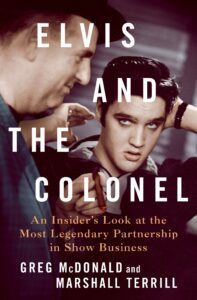
Excerpted from Elvis and the Colonel: An Insider’s Look at the Most Legendary Partnership in Show Business by Greg McDonald and Marshall Terrill. Copyright © 2023. Available from St. Martin’s Press, an imprint of Macmillan, Inc.
- Share on Facebook (Opens in new window)
- Click to share on Twitter (Opens in new window)
- Click to share on Google+ (Opens in new window)
- Click to share on LinkedIn (Opens in new window)
- Click to share on Reddit (Opens in new window)
- Click to share on Tumblr (Opens in new window)
- Click to share on Pinterest (Opens in new window)
- Click to share on Pocket (Opens in new window)

Greg McDonald and Marshall Terrill
Previous article, next article, support lit hub..

Join our community of readers.
to the Lithub Daily
Popular posts.

Follow us on Twitter
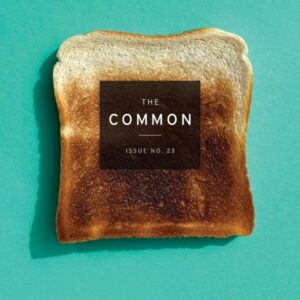
“A Letter to Kofi Annan”
- RSS - Posts
Literary Hub
Created by Grove Atlantic and Electric Literature
Sign Up For Our Newsletters
How to Pitch Lit Hub
Advertisers: Contact Us
Privacy Policy
Support Lit Hub - Become A Member
Become a Lit Hub Supporting Member : Because Books Matter
For the past decade, Literary Hub has brought you the best of the book world for free—no paywall. But our future relies on you. In return for a donation, you’ll get an ad-free reading experience , exclusive editors’ picks, book giveaways, and our coveted Joan Didion Lit Hub tote bag . Most importantly, you’ll keep independent book coverage alive and thriving on the internet.

Become a member for as low as $5/month
Advertisement
Elvis Presley Biography
- Share Content on Facebook
- Share Content on LinkedIn
- Share Content on Flipboard
- Share Content on Reddit
- Share Content via Email
Colonel Tom Parker, Elvis Presley's Manager
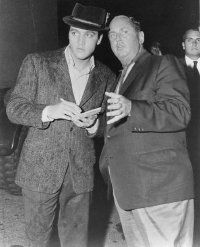
Nearly as legendary as his famous client was Colonel Tom Parker, Elvis Presley's manager. Colonel Parker was mysterious and colorful, and, under his guidance, his one and only client -- Elvis -- reached unimaginable heights.
Elvis added "Baby Let's Play House" and "I'm Left, You're Right, She's Gone" to his act in the spring of 1955. Less than a year later, he sang "Baby Let's Play House" on television for his second appearance on The Dorsey Brothers' Stage Show (February 4, 1956), just as his sensual performing style was beginning to create a national controversy.
If his hip-swinging performance on Stage Show raised eyebrows, then the lyrics to "Baby Let's Play House" added to the provocative connotation. Basically a proposition, the song is a plea from the singer to his girlfriend to return to him because he wants to "play house" with her, a slang term for an unmarried couple living or sleeping together. Despite the singer's plea, he takes a confrontational stance, telling his girl, "I'd rather see you dead than with another man."
In the spring of 1955, Bob Neal booked the Hillbilly Cat and the Blue Moon Boys on a tour with country singer Hank Snow. The tour was organized by Hank Snow Jamboree Attractions, which was owned by Snow but operated by a former carnival barker named Colonel Tom Parker.
Many colorful stories exist about Parker; some are no doubt true, while others have been exaggerated through the years. It's been said that he once covered a hot plate with straw and set baby chickens on top of it to make them "dance" to the tune "Turkey in the Straw." Another carny story tells of Parker painting sparrows yellow and selling them as parakeets.
Parker's country-western experiences included guiding country singer Eddy Arnold's career from relative unknown to star. Parker's title of "Colonel" does not refer to military rank but is an honorary title, which was bestowed upon him by the state of Louisiana in 1953. Later he was made an honorary Colonel of Tennessee as well. Much has been written about Colonel Tom Parker, not the least of which is that he was a very shrewd man.
A large portion of Elvis' audience by mid-1955 was made up of teenage girls. They were extremely enthusiastic during his stage performances, and Elvis learned to play to the girls, teasing them with his body movements and making them scream each time he swiveled his hips. During a summer performance in Jacksonville, Florida, Elvis jokingly invited all the girls in the audience to meet him backstage. But the joke was on Elvis: A swarm of screaming girls chased him all the way to his car and literally ripped most of his clothes off his body.
The incident terrified his mother, surprised the press, and delighted the Colonel, who had begun to monitor Elvis' career quite closely. Parker's position at Jamboree Attractions allowed him to quietly observe the young singer's steady rise in popularity.
As with other important events in Elvis' career, there are many versions of the story about how Colonel Tom Parker became Elvis' sole manager. Parker was supposed to have had a close working relationship with Hank Snow, but when he finally signed Elvis to a contract, Parker did not include Snow in the deal. Parker and Snow broke up their partnership over this matter, but Snow did not sue.
When the Colonel and Elvis signed their first contract in August 1955, Bob Neal still had a contract as Elvis' manager. Parker initially signed on as "special adviser," and his duties were to "assist in any way possible the buildup of Elvis Presley as an artist." Parker was also given the right to negotiate renewals on all existing contracts. At this point, Neal was kept on merely as a courtesy. When Neal's contract expired on March 15, 1956, he was completely out of the picture, and Parker became Elvis' full-time manager for a 25 percent cut.
When Parker began to take part officially in Elvis' career, Elvis was just a country-western singer. Though his style wasn't traditional and many of his most loyal fans were teenagers, Elvis still toured the country-western circuits and performed with other country stars. His records were played almost exclusively on country stations. If Elvis was going to live up to the potential the Colonel saw in him, he was going to have to be exposed to audiences outside the South on a wide scale.
As logical as this seems, the Colonel's plan was actually a bold move. After all, Elvis had never stepped foot outside the South, and northern audiences were unaccustomed to Southern musical traditions and sounds.
The first step in the Colonel's master plan was to find a recording company that could give Elvis national and international exposure. Learn about the development of Elvis' relationship with RCA Records in the next section.
For more fascinating information about Elvis Presley, see:
- Elvis Presley
- Elvis Presley Quotes
- Elvis Presley Collectibles
- Elvis Presley Songs
- Elvis Presley Movies
Please copy/paste the following text to properly cite this HowStuffWorks.com article:

- Be Heard Jukebox Archive
- In Case You Haven’t Heard
- Note From Lydia
- Behind The Song
- Legends of Song
- Producer’s Corner
- Gadgets & Gear
- Back Issues #118-59
- Back Issues #58-1
- Cover Artist Interviews
- Producer & Engineer Interviews
- Special Features
- Indie Music Features
- Guitarist Interviews
- Keyboardist Interviews
- Legendary Songwriter Interviews
- “5 Minutes With” Interviews
- Songwriter Essays
- iPic Multi-Purpose Pick Stylus
- Letters From Lydia Gift Book & CD
- Compilation #10
- Compilation #9
- Compilation #8
- Compilation #7
- Compilation #3
- Advertising
- Workshop Videos
- Group Photos
- Testimonials
Elvis’ Manager, Colonel Tom Parker
They call me mr. big, by bill demain.
They’re usually men of considerable girth, with loud mouths and bad hair. They smoke cigars. Sometimes they wear questionable accessories. A long silk scarf. An oversized LBJ-style cowboy hat. And behind their bluster, they have minds like steel traps, with which they snag every dollar and percentage point. These aren’t your garden variety rock managers. They are the bigger than life, Svengali-meets-Al Capone figures. The ones who can turn a great band into world-conquering icons, or conversely, ruin them. Step inside the bilking parlor and meet Colonel Tom Parker, and in the full article, Allen Klein, Peter Grant and Don Arden.
Colonel Tom Parker
Colonel Tom Parker with Elvis Presley, 1955, signing a contract with RCA.
Strange but true: Elvis Presley never performed a concert outside the United States. He was one of the top three most successful artists of all-time, the king of rock ’n’ roll, a cultural icon. He even owned his own jet. But the farthest he got in it was Honolulu.
The reason? Colonel Tom Parker. Though he harumphed about the security issues and production details involved in an overseas tour, the real obstacle was that Parker, nee Andreas Cornelius van Kuijk, was an illegal alien. To fly out of the country would be to risk not only being exposed but barred re-entry into the US.
He was born in either 1909 or 1910 in Breda, Netherlands (another theory says he was born in Russia to Jewish parents, and later adopted by a Dutch family). Little is known of his early days except that he left the Netherlands when he was 19, boarding a boat for parts unknown (in The Colonel, biographer Alanna Nash makes a strong case that he fled the country after murdering a woman). He turned up in Tampa, Fla. in the early 1930s, where he told people that his name was Tom Parker and he was from Huntington, W. Va.
His first job was as a traveling carny for Royal Amusement Shows. It was on the fairgrounds that Parker learned the guiding principles of his professional life: One, always have a gimmick. And two, when it comes to entertainment, the formula for success is in the lowest common denominator.
With the military drafting soldiers for WWII, Parker quickly found a wife (though there is no official license of the marriage), hoping to avoid service. He managed to slip through the cracks of the draft board, ending up with a 4-H for a hernia. In the mid-’40s, he took a job with the Humane Society, as a dogcatcher and the manager of a pet cemetery (a combination that poetically captures the essence of Parker). At fundraisers for the Society, Parker saw that hillbilly singers were the biggest draw. That was enough for him to head to Nashville.
He worked first as a tour manager for Grand Ole Opry stars Roy Acuff and Minnie Pearl. It was during this time that his friend, Louisiana governor Jimmie Davis, made him an honorary “Colonel.” From then on, Parker insisted he be addressed with the title. He managed Hank Snow and Eddy Arnold (who became the first country star to cross over to the pop charts), but they were mere stepping stones to his biggest quarry. In 1955, he got Gladys and Vernon Presley to sign a contract for their 20-year-old son Elvis, appointing the Colonel as “sole and exclusive advisor, personal representative and manager.” He might well have added “owner.”
Parker was pivotal in Elvis’ quick rise. First, he got RCA to buy out Presley’s contract from Sun for an unprecedented $35,000. Then, using the sense of timing and showmanship he’d learned as a carny, he set about making Elvis a sensation. Along the way, he invented some of the hallmarks of celebrity management: no interviews, money up front, total media control, spin, building an audience region by region, clever use of advance forces to build audience interest, and massive concert merchandising.
When Elvis was drafted, it’s said that Parker struck a deal with the U.S. military to give his boy a cushy appointment in Germany. In 1960, when Elvis returned stateside, the Colonel convinced him to trade touring and making albums for a career in the movies. Against his better judgment, Elvis relented. Many books have been written about the effects of this decision—suffice to say that Parker sacrificed Elvis’ credibility to a parade of increasingly inane films ( Clambake , anyone? How about Kissin’ Cousins ?).
In return for his efforts as manager, the Colonel took 25 percent of everything Elvis earned. But that number is deceptive. As Peter Guralnick explains in his definitive Elvis biography Careless Love : “If Elvis were contracted to MGM for a picture for which he was to receive $750,000 plus 50 percent of the profits, Colonel would take his normal 25-percent management fee on that portion of the deal that represented salary. But on the profits there would be a 50-50 split, since, in essence, with all the work Colonel put into publicity and promotion on the picture, its success represented, really, a joint venture.” The math worked the same way for Elvis’ record deal.
Early on, Parker learned that the real money in the music business was in publishing. Knowing how coveted a cover version by Elvis was for songwriters, he insisted that his boy get half the publishing on any first-time song that he recorded. Many songwriters refused to cooperate, though Elvis did land his name as a co-writer on many album tracks, and a few hits, including “Heartbreak Hotel” and “All Shook Up.”
Perhaps the Colonel’s proudest moment came in 1970, when he turned Elvis into a Vegas perennial. The previous year, Elvis’ return engagement to performing had broken all Glitter Gulch records, with gross receipts over $1.5 million. The Colonel signed a contract with the International Hotel, guaranteeing Elvis $1 million a year for just eight weeks’ work annually, lasting through 1974.
This deal was the beginning of Elvis’ long slide into drug addiction and paranoia (Vegas was also the Colonel’s undoing, as he became addicted to gambling and lost his fortune). When Presley died in 1977, the Colonel flew not to Memphis , but New York City, to work on Elvis memorial product deals. He showed up at the funeral wearing a Hawaiian shirt and a ball cap, never once looking at the casket. At the time of his death, Elvis had been searching for another manager.
The Colonel continued to make money off Elvis for the next 20 years. When RCA sued him in 1982, he finally revealed his identity in court, saying, “… the court lacks jurisdiction, since I am not a citizen of the United States or any foreign country.”
He died in 1997. Of the estimated $100 million he had made from Elvis, he left less than $1 million behind. The rest he had gambled away.
From “Notorious Rock Manager: They Call Me Mr. Big”
Performing Songwriter Issue 91 January/February 2006
Photo by Glenn A. Baker/Redferns/Retna
Category : Best of PS
If you enjoyed this article, subscribe to receive more just like it.

Comments (1)
Trackback URL | Comments RSS Feed
Sites That Link to this Post
- Elvis Presley's "Love Me Tender" Movie Debut 54 Years Ago | November 15, 2010
Leave a Reply Cancel reply
Your email address will not be published. Required fields are marked *
Save my name, email, and website in this browser for the next time I comment.
- Name First Last
Producer Spotlights
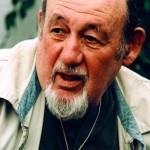
Orrin Keepnews
Orrin Keepnews, one of the most respected producers in jazz history, played an integral role in the birth of modern jazz.

Grammy-winning record producer Don Was shares studio stories and insight on his work with the Rolling Stones, Bob Dylan, Paul Westerberg, Kris Kristofferson and more.

Record producer Bob Ezrin talks about his work on such seminal records as Alice Cooper’s Billion Dollar Babies, Pink Floyd’s The Wall and Lou Reed’s Berlin.

Jim Dickinson
A 2005 interview with the late Jim Dickinson about his work with Alex Chilton, Paul Westerberg and his North Mississippi Allstar sons Luther and Cody.
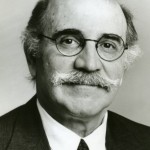
Tommy Lipuma
For five decades this eminent producer has been delivering records for some of the best-known names in jazz and pop: Barbra Streisand, Miles Davis, George Benson, David Sanborn, Dave Mason, Joao Gilberto, Al Jarreau, Michael Franks, Bob James, Natalie Cole and Diana Krall to name but a few.
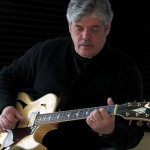
Lloyd Maines
Here’s a fun — albeit a little geeky — way to kill a few minutes in any well-stocked record store. Comb the racks until you’ve amassed discs by 10 different Texas artists. Now check the producer credit on the back of each album. Amazing, ain’t it? You’d almost think this Lloyd Maines character had a […]
Performing Songwriter Ent., LLC

- Elvis Australia
- For Elvis Fans Only
- Elvis Presley Photos
- Elvis Presley Music
- Elvis' Movies
- Elvis Interviews
- Elvis Reviews
- FTD Reviews
- DVD Reviews
- Book Reviews
- Follow That Dream
- DVDs & Blu-rays
- Elvis Bootlegs
- ElvisPresley.News
- Elvis SongBase
- Elvis Biography
- Elvis Presleys Graceland
- Elvis Pictures
- Elvis Photos
- Elvis Books
- Elvis Memorabilia
- Vinyl LP Records

Colonel Tom Parker | Elvis Presley's Manager
Nearly as legendary as his famous client was Colonel Tom Parker, Elvis Presley's manager. He was mysterious and colorful, and, under his guidance, his one and only client -- Elvis -- reached unimaginable heights.
Colonel Tom Parker's involvement in the music industry began as a music promoter in the late 1940s, working with such country music stars as Minnie Pearl, Hank Snow, June Carter and Eddy Arnold, as well as film star Tom Mix. During this time he received the honorary title of 'Colonel' in 1948 from Jimmie Davis, the governor of Louisiana. His involvement with Elvis Presley began when he booked Presley as the opening act for Canadian singer Snow. On August 15, 1955 Elvis Presley was signed by 'Hank Snow Attractions'.
Interview with Colonel Tom Parker (1987)
Shortly thereafter, 'Colonel' Parker took full control and recognizing the limitations of Sun Studios, negotiated a deal with RCA Victor Records who acquired Elvis' Sun contract for $35,000 on November 21, 1955.
Parker was a master promoter who wasted no time in furthering Presley's image. Colonel Parker managed Elvis Presley from 1955 until the singer's death in 1977. Prior to managing Presley, Parker helped transform Eddy Arnold into a country superstar with his own radio shows, movie roles, Las Vegas bookings, and an unparalleled resume of #1 records. In steering the careers of both men, Parker revolutionized the artist management role, displaying an unprecedented marketing savvy while exercising near-total control. His energetic, all-encompassing management style created a blueprint that is still followed today.
Parker, a purposeful, perceptive, and mysterious character, was born Andreas Cornelis van Kuijk in Breda, Holland, and entered the United States illegally in 1929. After serving in the Army for three years in Hawaii, he moved to Florida, where he joined the Johnny J. Jones and Royal American carnivals, passing himself off as a native West Virginian under the name of his former commanding officer, Thomas Parker.
After several years of carnival life, Parker settled down and became director of the Tampa Humane Society (he was, among other things, Tampa's chief dog officer) where he developed a remunerative range of pet service-pitches that translated seamlessly into showbiz promotion.
Interview with Colonel Tom Parker (1993)
He started off with Gene Austin, Roy Acuff, and Ernest Tubb, focusing at first on Florida tours exclusively but gradually expanding his show-business activities until in 1944 he met Eddy Arnold on a Jamup & Honey tent show. He managed Arnold as his exclusive client from 1945 until 1953, developing a range of unique promotions that helped make the singer one of the most prolific hit-making artists of all time.
By early 1955, Parker had set his sights on the emerging Elvis Presley, whom he placed as an opening act on tours by his new client, Hank Snow. By August, Parker had acquired a controlling interest in Presley's management contract, and two months later set up a deal for RCA to purchase Presley's contract from Sun Records for the unheard-of sum of $35,000. (With $5,000 going to Presley).
Under Parker's exclusive guidance, Presley went on to become one of the most influential cultural figures of the twentieth century - a tribute to a talent and a gift for communication that continues to defy definition. Parker secured for Presley broad national exposure through television at a time when other managers feared that the new medium would undercut the value of personal appearances. Calling the shots in Hollywood, Parker made Presley a #1 box-office star and kept the entertainer's career alive during his two-year stint in the Army.
The Colonel
Did you see it?' the old man asked, shifting his mountainous heap of flesh to the edge of the chair, his eyes open wide and twinkling. 'What a hell of a thing! Unbelievable!'
It was June 18, 1994, the day after O. J. Simpson's infamous Bronco run, and Colonel Tom Parker, with his attentive wife, Loanne, at his side, held court for two visitors at the N'Orleans Restaurant, a meat 'n' two joint in a run-of-the-mill strip mall named Lucky's on the outskirts of the gambling capital of the world.
Priscilla Presley & Jerry Schilling | Colonel Tom Parker
Like the rest of the country, Parker had been mesmerized by Simpson's bizarre highway chase. But now his reaction, with his face momentarily frozen in awe, spoke silently of something else - not of a fascination with sports or the subtleties of race relations, but of a sort of perverse pride, perhaps, in an elite and remarkable fraternity of rogues. Or at the very least, in a man who had taken a terrible risk, and managed to beat the odds.
This was my second of three visits with Parker, whose own survivor instincts so defied description that many thought him indestructible. Yet less than three years later, also in Vegas, far from his birthplace of Breda, Holland, where he first learned the art of the hustle as an errand boy in Dutch fairs, circuses, and carnivals, he succumbed to the complications of a stroke at the age of eighty-seven.
A master illusionist in business and in the business of life, Tom Parker made things appear and disappear at will, and created something very great out of nothing - including himself. Out of respect for that, if nothing else, I went back to say good-bye.
The giant marquee outside the Las Vegas Hilton was both sweet and succinct (FAREWELL, COLONEL PARKER), but not everybody knew what it meant.
'You here to gamble?' asked my taxi driver, who had shuttled me in from the airport on a late January day in 1997 and who had uttered not a word until tip time.
'No, I'm going to the memorial service for Colonel Parker'.
A beat. 'Dat the fried chicken guy?'
At least one cynical obituary writer, Serene Dominic, seconded that thought in a Phoenix New Times article headed 'Cooked the Colonel's Way - Colonel Tom Parker Has Kicked the Bucket, and the Original Recipe for Rock 'n' Roll Rotisserie Goes with Him'. But the 160 mourners who filtered into Ballroom D saw him as one of the last giants and true iconoclasts of the century - a penniless immigrant who slipped into the country, befriended U.S. presidents and corporate CEOs, created both an icon and a $4-billion business, and never let any of it get in the way of what mattered most - playing the game.
Through it all, he remained as individualistic, as shrewd, rude, crude, and fun-loving as ever. At his death, he still delighted in practicing what he called the art of 'snowing', the exquisitely performed act of separating people from their money, leaving them with a smile on their face and melting away before they realized what had taken place.
While some would argue that Parker's very body was a temple to gluttony, greed, and feeding off the dimmer wits of others, it was the Snowman his friends had come to honor this day, his widow, Loanne, posing an intriguing question.
'I want to leave you with just one thought', she said, addressing the crowd, which had passed a lobby-card-size photo of the couple at the entrance. 'If Thomas A. Parker had never existed, how would each of your lives be different today?'
One person who couldn't answer that question was Elvis Aaron Presley, whose piped-in versions of 'Memories' and 'How Great Thou Art' opened and closed the service with ghostly reverence. The Elvis Presley who had first come to Vegas in 1956 as an acne-faced adolescent left it twenty years later as a pathetic, corseted cartoon, his body blown from years of abuse, his spirit picked hollow.
For all of the twenty years that Parker outlasted his greatest discovery, he would also have to live with the allegations that he had destroyed him, stifling his artistry in third-rate Hollywood formula pictures, suffocating his ambition in 837 Vegas performances from 1969 to 1976, and killing his will to live by refusing to challenge him in meaningful ways - a European tour, a dramatic film role to reclaim his self-respect, a crack at a memorable song.
Whether regarded as a meretricious and evil confidence man, or as a brilliant marketer and strategist, as remarkable as the star he managed, no figure in all of entertainment is more controversial, colorful, or larger than life than Tom Parker. 'He was so immense, so gigantic in his way', remembers writer Robert Kotlowitz, an RCA publicist in the late '50s and early '60s. 'His style was equivalent to a great politician's, with so much flamboyance and wit and, underneath it all, cunning. He had to beat the whole world'.
Yet at his death, Parker was blasted by rock critic Dave Marsh as 'the most overrated person in the history of show business', and assessed by Dutch journalist and filmmaker Constant Meijers as 'a nobody who needed a somebody to be anybody'. To this day, a favorite debate question among pop music journalists is whether Elvis, whom the Colonel often referred to in carnival terms as 'my attraction', would have remained a regional act without Parker's guidance, or if the young performer was such a blazing comet that no one could have stopped his streak across the sky.
The probability is that neither man would have been as big in his field without the other, Parker realizing, like P. T. Barnum, that the promotion of a curiosity was just as important as the curiosity itself. A chameleon who was many things to many people, Parker has his staunch defenders - as a visionary, a businessman, and a friend, even by those who got up from the losing side of the bargaining table. And while Parker probably would have referred to himself as a promoter more than anything else, having marketed the icon most recognizable in all the world after Coca-Cola, Chet Atkins, who dealt with many of the biggest artists during his tenure as an RCA Records executive, pronounced Parker 'the best manager I ever saw.... Whatever he cost Elvis, he was worth it, because Elvis would've ... lost that luster in no time if it hadn't been for the Colonel'.
Mike Crowley, who traveled with Parker in the concert years of the '70s and is now a talent manager himself, speaks, like many, of Parker's loyalty, and also justifies his treatment of Elvis, the addict. 'Nobody killed Elvis except Elvis, and nobody could have helped Elvis but Elvis. The only other thing he could have done was walk away'.
Parker himself never bothered to address his critics, nor did he try to carve out much middle ground in the debate of whether he was the devil or angel in Elvis's own private hell. When pressed about his handling or mishandling of Elvis, he'd merely bristle, stamp his cane into the ground, and repeat his stock answer: 'I sleep good at night'.
Beyond that, the old Dutchman who understood America far better than most Americans simply threw out the line he'd used for decades to keep himself out of headlines ('Elvis is my only client and my life, so I never give out stories about myself'), allegedly because he was writing a memoir to be called How Much Does It Cost If It's Free? But it was an excuse he had concocted to keep others from looking too closely at the hocus-pocus of his life, and from having to explain himself, especially in light of a 1980 lawsuit in which the state of Tennessee accused him of 'overreaching' in his fiduciary responsibilities to Presley.
If Elvis was unknowable by his manager's design, the Colonel was beyond knowing, even to his own family. In 1980, Parker's brother-in-law, Bitsy Mott, who spent many years on the road in the Colonel's employ, was asked to explain the man he'd known for nearly half a century. 'That man's a mystery', he said, and little more, for not even he knew that Parker had a secret to protect, a secret that colored nearly everything he did.
On the surface, it would appear only that Parker had entered the country illegally and had never become a naturalized U.S. citizen. But if something darker had happened in the distant Netherlands, it must have been deep, shameful, and nearly unforgivable, at least to Parker himself. Certainly he never talked about it, or about his Dutch upbringing, to either Presley or any of his previous clients. And when the Colonel's stepson, Bobby Ross, died in 1978, it was without benefit of the knowledge that the man who had reared him from the age of ten had not been born as Thomas Andrew Parker in Huntington, West Virginia, as he always claimed, but as Andreas Cornelis van Kuijk - known as Andre to his Dutch biological family.
I first met Colonel Parker in December 1992, and I wondered then how the secret of his origins - revealed to the world at large in 1981 - impacted the all-dominating decisions he made in shaping nearly every event in the life and career of Elvis Presley.
At first glance, Presley and Parker appeared to have little in common except the raging fire of ambition, shaped by a shameless ferocity both struggled to keep hidden. Yet I discovered as I began to research this book that in the strange choreography of chance and coincidence, the fates of Elvis Aaron Presley and Thomas Andrew Parker were bound by two still surging events, and the pull each incident had on both of them.
Despite the hundreds of books profiling Presley and his career, the story of the relationship between these men, I saw, had yet to be uncovered. Parker was a man of not just one, but many secrets, and the keeper of several fantastic tales he fought to preserve, with Elvis almost always paying too much of the price.
On each of my three visits with Colonel Parker, I sat across the table from him and looked into his eyes - hypnotic pools of unearthly blue - and wondered, Just who are you?
And so I decided to research the story chronologically, trying to find the boy who became the man. That mission took me to Holland, where I met with the kindest and most cooperative sources on this book: Parker's Dutch family, who were as mystified by his behavior and as dedicated to finding the truth as I was.
Over a period of three years, I interviewed and corresponded with several members of the van Kuijk clan, including the Colonel's ninety-two-year-old sister, Marie. And with the help of American journalist Bill Burk, I established an ongoing and treasured friendship with Parker's niece, Mieke Dons-Maas, who worked so hard in the 1990s to try to reunite her mother, Engelina, with her brother in America. Along with her husband, Ted, and friends Angelo Somers and Hanneke Neutkens, who spent years gathering materials for a proposed Parker foundation, we united as a team, chasing the apparition of a lad who had walked the Breda streets so long ago on the first leg of his remarkable journey.
In the end, my research led me to realize that the tale of Colonel Thomas Andrew Parker, né Andreas Cornelis van Kuijk, is, beneath the veil of secrecy, a tragedy, and very nearly the stuff of Shakespeare.
The following is my attempt to resolve the conundrum of his life.
- Alanna Nash
Excerpted from The Colonel by Alanna Nash.
Colonel Tom Parker, Elvis Presley's Manager
As Presley's fame grew, people became interested in Parker as well. For a while he lied about his early years, claiming to have been born in Huntington, West Virginia and that he had run away at an early age to join a circus run by an uncle. The truth about his early years was revealed when his family in the Netherlands recognized him in photographs of him standing next to Elvis; it was confirmed when Parker tried to avert a lawsuit in 1982 by asserting that he was a Netherlands citizen.
He was actually born in Breda, Netherlands on June 26, 1909. Still carrying his baptism name, Andreas Cornelius van Kuijk fled his native land at about the age of 18, joined the United States Army, then changed his name to Tom Parker and became part of the circus world some time after leaving the Army. He also worked as a dogcatcher and a pet cemetery proprietor in Tampa, Florida, in the 1940s.
Colonel Parker died of a stroke on January 22, 1997, aged 87.
Tupelo's Own Elvis Presley DVD
- Elvis Articles
- Latest Interviews
- Elvis Interviews A-Z
- Video & Audio
- Contributors
- Elvis CD Reviews
- FTD CD Reviews
- DVD & Blu-ray Reviews
- Elvis Book Reviews
- Elvis Reviews Central
- Elvis CD News
- Elvis DVD & Blu-ray
- Elvis Book News
- Vinyl Record News
- Elvis Presley Biography
- Elvis SongDataBase
- Elvis in the U.S. Army
- The TCB Band
- The Memphis Mafia
- Colonel Tom Parker
- The Lisa Marie Jet Airplane
- Elvis Presleys Cars
- Elvis' 1 Billion Record Sales
- Elvis and the Events of 1977
- Elvis History 1669-1977
- Elvis & Racism
- Elvis Charts
- Lisa Marie Presley
- Danielle Riley Keough
- Benjamin Keough
- Priscilla Presley
- Vernon and Gladys Presley
- Vernon Presley
- Grandpa Jessie Presley
- Minnie Mae Presley
- Elvis' Family History

Elvis Australia was founded in 1996 ... www.elvis.com.au was literally born from the concept of wanting to represent 'Elvis in Australia', so www. elvis .com. au ... Read more .
Information
Elvis presley.
Elvis Presley's songs are unforgettable - they have stood the test of time, especially his singles of the 1950s, a decade in which he had a song at No. 1. for 59 weeks and 4 No. 1 albums ('56-'59). Read More .
Where do I go from here?
My Years With Elvis
Charles Stone
Appearances
Featured products.
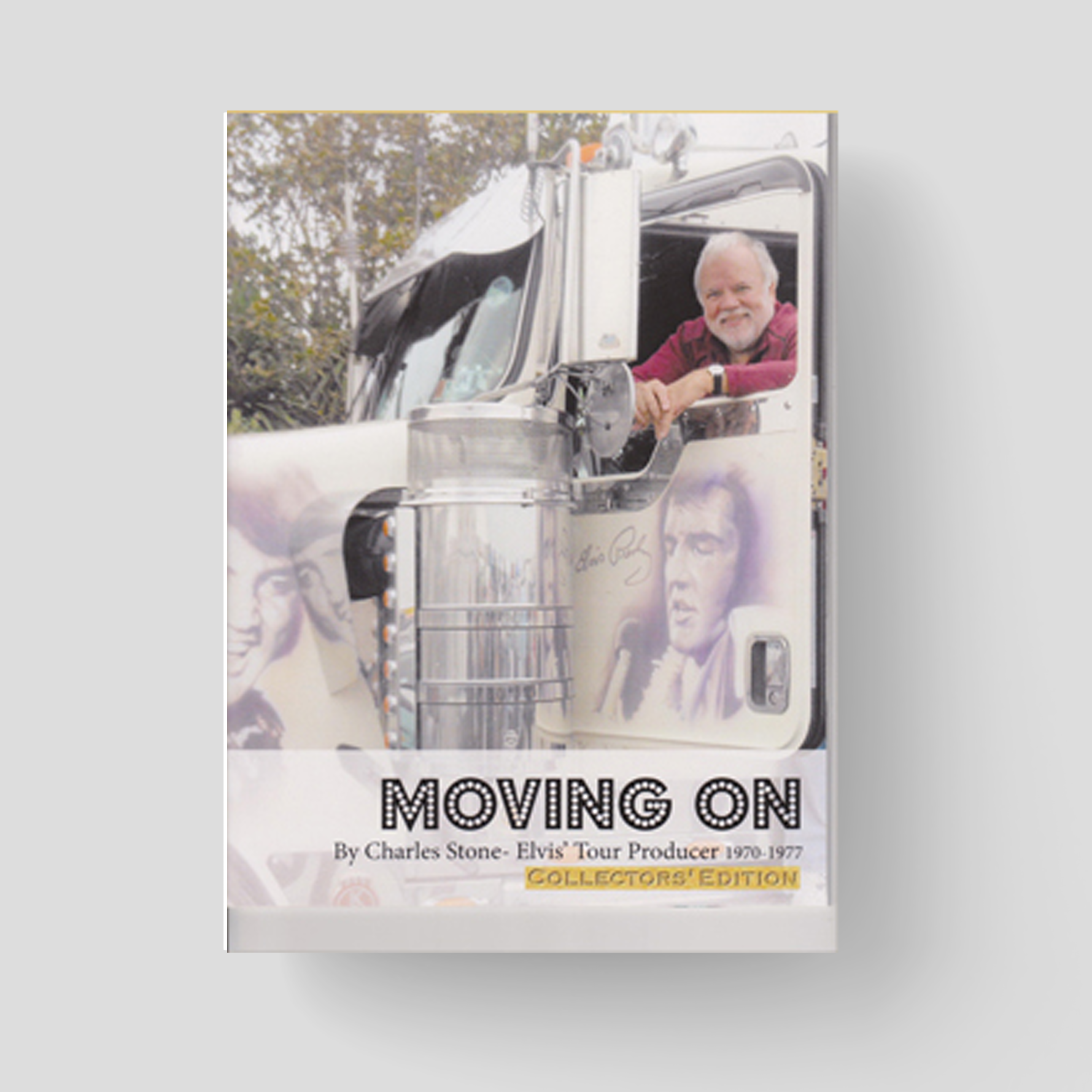
MOVING ON BOOK

LIFE IN THE ELVIS WORLD
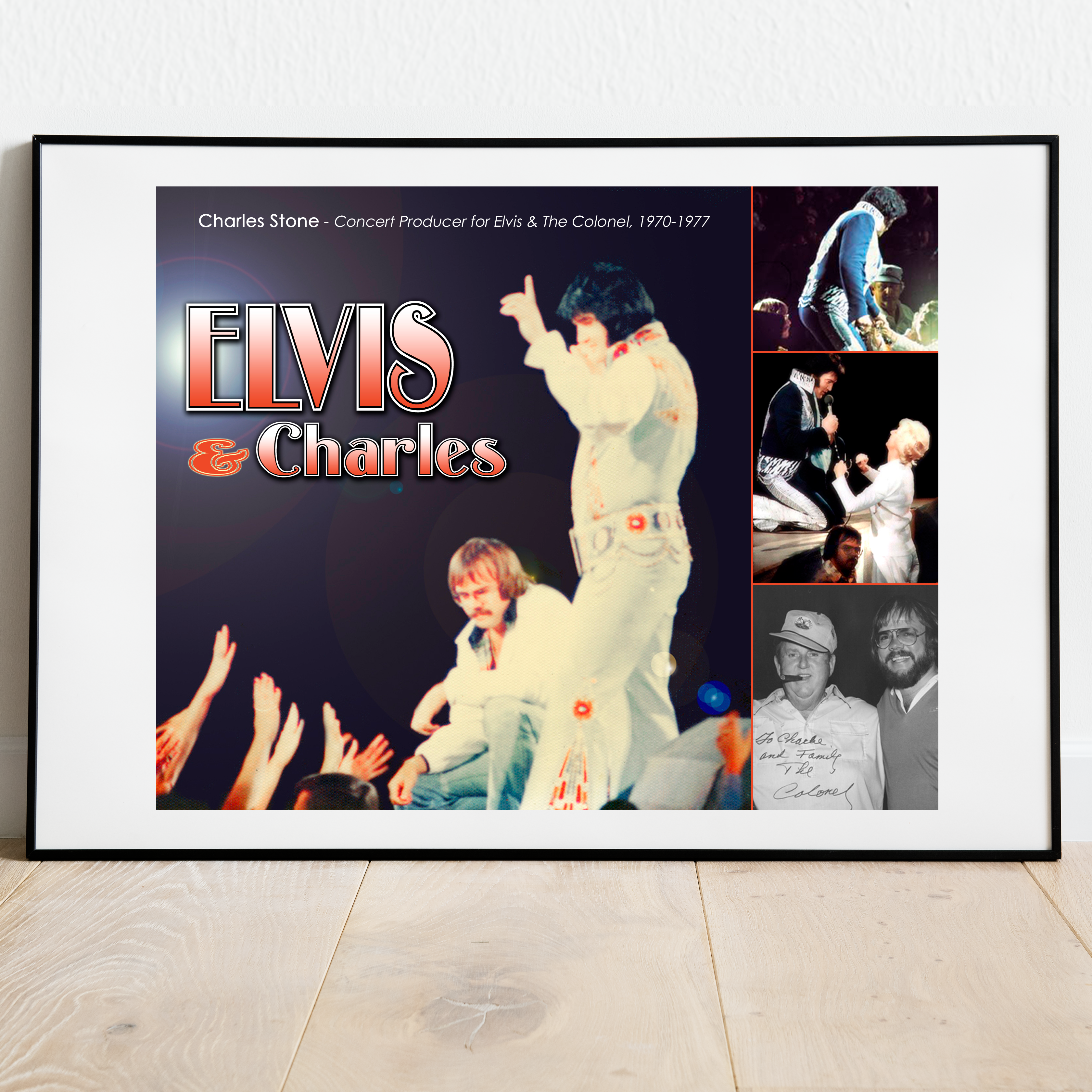
SIGNED PHOTOS

MY YEARS WITH ELVIS AND THE COLONEL
- Share full article
Advertisement
Australia Letter
The deeper meaning of elvis in australia.
I went to the Parkes Elvis Festival thinking I’d learn something about what America used to be. I left thinking more about Australia.

By Damien Cave
The Australia Letter is a weekly newsletter from our Australia bureau. Sign up to get it by email.
The first time I learned to love Elvis Presley, I was in my early 20s, and visiting Graceland during a cross-country trip with a few friends. I remember watching videos of his concerts in a dark theater there and being amazed at his energy and talent. Next, there was Baghdad Elvis.
When I covered the war in Iraq in 2007, a photographer we worked with happened to have mastered a near-perfect rendition of “Suspicious Minds.” At one point, in our heavily fortified compound on the Tigris River, he showed up wearing a bespoke white jumpsuit, circa 1973, leading us all in a night of raucous karaoke — loud enough to drown out the sound of bullets in the distance.
And then there was Parkes, the small town in rural New South Wales, which hosts the largest annual Elvis festival in the Southern Hemisphere (and possibly the world). I’d been hearing about it ever since I came to Australia but this year, I decided to go, and to bring my 11-year-old daughter with me.
I was looking for more than just spectacle, though there was plenty of that. I was looking for heart. Why do 25,000 people come out to celebrate a dead American rocker in the middle of a continent where Elvis never played a concert?
I thought maybe there was something to say about the America he seemed to represent, a country that had been more optimistic, carefree, effusive, and excessive than the more earnest and angry United States we’ve seen over the past few years. Perhaps Elvis nostalgia was also America nostalgia?
But what I found — as you can see in my article , with amazing photos from Abigail Varney —was simpler and more local, if no less profound. America was really not the point. Small town Australia and participatory “have a go” Australia was what animated the event.
According to Elvis tribute artists — and Elvis’s former tour manager, who made the trek from back home in the U.S. — Australians of all social classes, political persuasions and ages were more likely to dress up, sing, march in the parade, or play rugby, all while dressed up as Elvis, all while encouraging each other to get involved and have some fun.
The Australian festival was unique because the lines between serious and silly were blurred. While Americans listened and admired Elvis, Australians made him their own.
I’ve written a lot about that Australian penchant for pulling people into an activity — it’s a big part of the idea-driven memoir I published here, called “Into the Rip,” which will be out in the U.S. in the next few months with a different title. But in Parkes there was an extra layer of verve that only the combination of Elvis and small town Australia could possibly provide. My daughter loved it. So did I.
Now here are our stories of the week.
Australia and New Zealand
Meet Mouth Almighty, a Different Kind of Fish Dad . A study of Australian fish that care for offspring through mouthbrooding shows that things underwater are not always as monogamous as they seem.
Australian Gets 12 Years for Anti-Gay Killing of an American in 1988 . Scott Johnson, a U.S. graduate student, was pushed off a cliff, in a case that was first ruled a suicide but that his brother refused to let go of.
Helicopter Catches Booster Rocket Falling From Space . After sending a payload of 34 small satellites into orbit, the space company Rocket Lab used a helicopter to catch the 39-foot-long used-up booster stage of the rocket before it splashed into the Pacific Ocean.
How the King of Rock ’n’ Roll Still Makes Australia Sing. Elvis never played a concert “down under,” but that hasn’t stopped tens of thousands of Australians from making him their own at an annual festival.
Around the Times
Inside the Apocalyptic Worldview of ‘Tucker Carlson Tonight’ . A New York Times analysis of 1,150 episodes reveals how Tucker Carlson pushes extremist ideas and conspiracy theories into millions of households, five nights a week.
As Victory Day Looms in Russia, Guesswork Grows Over Putin’s Ukraine Goals . The Russian holiday celebrating the Soviet triumph over Nazi Germany is viewed by Ukraine and NATO as a stage for the Russian president to proclaim a turn in the war.
Abortion Pills Stand to Become the Next Battleground in a Post-Roe America . Medication abortion allows patients to terminate early pregnancies at home. Some states are moving to limit it, while others are working to expand access.
Much Gilt, Little Guilt . The Met Gala 2022 celebrated themes of opulence, excess and fame.
Enjoying the Australia Letter? Sign up here or forward to a friend.
For more Australia coverage and discussion, start your day with your local Morning Briefing and join us in our Facebook group .
Damien Cave is the bureau chief in Sydney, Australia. He previously reported from Mexico City, Havana, Beirut and Baghdad. Since joining The Times in 2004, he has also been a deputy National editor, Miami bureau chief and a Metro reporter. More about Damien Cave
Find the Right Soundtrack for You
Trying to expand your musical horizons take a listen to something new..
Our review of Taylor Swift’s “The Tortured Poets Department.”
Mdou Moctar ’s guitar is a screaming siren against Africa’s colonial legacy.
How “Stereophonic” made musicians out of actors.
Judith Hill sang with pop royalty. Now she is composing her own story .
St. Vincent dives headfirst into the darkness.

Elvis' Manager Said He'd Lose Everything After a Nasty Fall
I n 1966, Elvis Presley’s manager, Colonel Tom Parker, decided he needed to exercise stronger control over his celebrity client. Elvis’ drug use had ramped up, something everyone in his life was aware of, and he fell and hurt himself while under the influence. Parker warned Elvis that if he didn’t take his advice, he would lose everything.
Elvis’ manager told him he would lose everything after he fell and hit his head
In 1966, Elvis’ friend, Joe Esposito, came to pick the singer up to go to the studio. He found him in the house, woozy, with a sizable lump on his head.
“Into 1966, he started taking downers more heavily, gradually at first,” bodyguard Sonny West said in the book Elvis: What Happened? by Steve Dunleavy. “But he started heavy into them more and more as he got more and more bored. Around about that time, he fell very badly in the bathroom and hit his head. He got a concussion and he lost his equilibrium for a while. It was a real bad fall. He said he slipped. But he had been heavy into yellow jackets and Seconals. He was half asleep when he had that fall.”
Esposito called Parker, who arranged for a doctor to come to the house. The doctor found that Elvis had a mild concussion, but was otherwise fine. Still, Parker took the opportunity to have a stern talk with Elvis.
“The Colonel went back in and talked to Elvis,” Marty Lacker recalled in the book The Colonel by Alanna Nash, “and he said, ‘Here’s the way it is. From now on, you’re going to listen to everything I say. Otherwise, I’m going to leave you, and that will ruin your career, and you’ll lose Graceland and you’ll lose your fans. And because I’m doing all this extra work for you, I want fifty percent of your contract.’”
Elvis’ manager shook up his entourage after the fall
Elvis was not the only one who received a stern talking to from Parker after his fall. Parker turned on the singer’s entourage, demanding to know how they let this happen.
“The Colonel took us out into the hall,” Lacker said, “and he said, ‘Goddamn you guys, why do you let him get this way? He’s going to mess up everything! They’ll tear up the contract!’”
He then began issuing orders to the group, giving some new obligations and stripping titles from others. Lacker said he found it all disheartening .
“To see Elvis acting that way, and to hear this old, fat bastard spewing edicts like he was Elvis’ ruler just made me sick,” he said, per the book Careless Love: The Unmaking of Elvis Presley by Peter Guralnick. “In fact, it destroyed my desire to be part of the group.”
The singer allowed Colonel Parker to make all these changes without much argument
Typically, Elvis liked to be the one in charge, so his entourage was surprised to watch him cave to Parker’s requests.
“Colonel told Elvis, ‘You’ve got to behave yourself. You can only go so far,’” Elvis’ barber, Larry Geller, recalled. “And Elvis knew the Colonel was a dangerous enemy. ”
Elvis Presley Bought a Complete Stranger a Life-Changing and Expensive Gift
Parker even ordered Elvis to stop spending time alone with Geller, as he worried the barber was filling his client’s head with spirituality. Elvis loved Geller, but he didn’t fight the demand .
“I was surprised at how attentively Elvis was listening,” Priscilla Presley wrote in the book Elvis and Me . “Elvis had always argued with anyone, even me, who said anything against Larry. At one point, it seemed Elvis would cut off his right arm for Larry. But now Elvis promised the Colonel he wouldn’t spend any more time than he had to with him. He kept his promise. He only used Larry to style his hair and was never alone with him again.”
How to get help: In the U.S., contact the Substance Abuse and Mental Health Services Administration helpline at 1-800-662-4357.
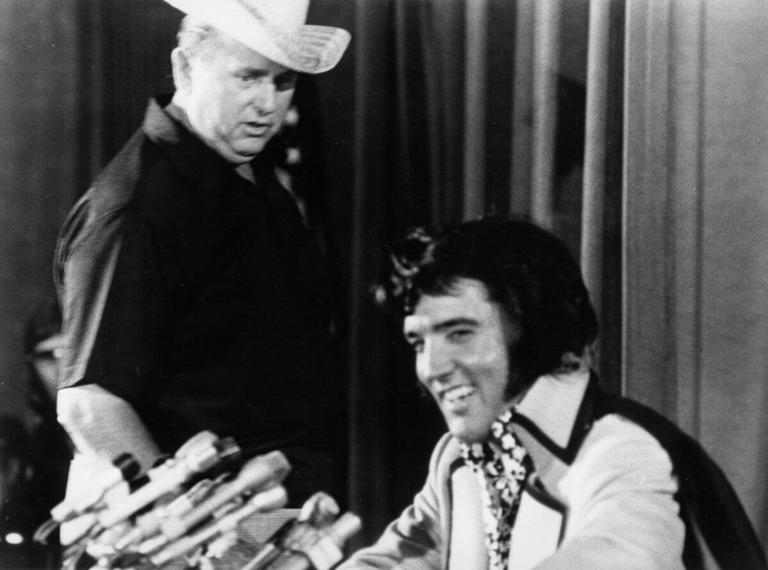
- Election 2024
- Entertainment
- Newsletters
- Photography
- Personal Finance
- AP Investigations
- AP Buyline Personal Finance
- AP Buyline Shopping
- Press Releases
- Israel-Hamas War
- Russia-Ukraine War
- Global elections
- Asia Pacific
- Latin America
- Middle East
- Election Results
- Delegate Tracker
- AP & Elections
- Auto Racing
- 2024 Paris Olympic Games
- Movie reviews
- Book reviews
- Personal finance
- Financial Markets
- Business Highlights
- Financial wellness
- Artificial Intelligence
- Social Media
Co-signed by Elvis Presley’s tour manager, Kraig Parker brings tribute act to Coeur d’Alene Casino
- Copy Link copied
The jet black hair and sideburns are real. As is the soft Southern drawl.
The only difference is Kraig Parker got his from living in Dallas, and Elvis Presley, the performer to whom he has paid tribute for the last 20 years, got his growing up in Mississippi and Memphis.
Over the years, Parker said he’s gotten his Presley transformation down to a science, needing just about an hour to become the rock ‘n’ roll icon.
“It takes a little bit longer than walking into the phone booth and walking out as Superman…” he said. “Just a little bit of makeup, get the blow dryer going and the hair mousse and all that fun stuff. Put on the suit and it’s time to rock and roll, baby.”
Fans can hear Parker’s spot-on imitation of the King for themselves when he brings his tribute act to the Coeur d’Alene Casino on Thursday.
The son of a big Presley fan, Parker grew up listening to the singer and collected a few Presley records of his own. He began singing around age 10 and would imitate Presley for fun.
In high school, he started a rock ’n’ roll band, adding a Presley song into the band’s set list here and there, but his career performing as Presley didn’t take off until he performed at his office’s Presley-themed party.
Parker had to be persuaded to perform, but once he saw his then-co-workers’ reactions, he was hooked.
“When you’re a singer, you like a solid reaction from the audience,” he said. “It’s like getting fed, so I was fed Elvis, so to speak. A taste I couldn’t put down.”
Parker then began doing solo performances at weddings, retirement parties and birthdays.
To get his tribute to Presley as accurate as possible, Parker studied the singer’s music and videos of his performances.
He said the martial arts Presley incorporated into his live shows was difficult to master, though he also paid special attention to Presley’s body movements, charisma and vocal range.
“There’s a lot of stuff to try and master if you really want to take on Elvis Presley and do it right,” he said. “When I did start getting serious about it, it did take a lot of practice to hone the craft and be as respectful as you can. You’ve got to bring the King to the people.”
As the number of bookings he received grew, Parker decided it was time to take his act to the next level and formed the Royal Tribute Band and Orchestra.
Together Parker and the band created a Las Vegas-style show that features all of Presley’s greatest hits, including “Heartbreak Hotel,” “Jailhouse Rock,” “Don’t Be Cruel,” “My Way,” “Suspicious Mind” and “Burning Love.”
“Hopefully any of the big ones you can pull out of the hat, we’ll have them in the show,” Parker said.
Parker especially likes singing the gospel songs Presley was fond of and said “How Great Thou Art” is one of his favorite songs to perform.
Parker’s tribute to Presley has earned him and the Royal Tribute Band and Orchestra acclaim from audiences around the world, and he has performed with Presley’s backing groups the Jordanaires, the Stamps Quartet and the Sweet Inspirations.
Adding even more credibility to his performance is Charles Stone, who worked as Presley’s tour producer in the ’70s and who now manages Parker and the band.
“Sometimes it’s hard for me to believe that I’m actually hooked up with him,” Parker said.
Parker and Stone were introduced after Parker and the band headlined an Elvis Presley birthday event at the Hard Rock Café in Dallas.
Stone’s wife encouraged him to reach out to Parker and after attending a few more shows, he did.
“He approached me and said ‘How would you like to get out of these bars and restaurants and go on tour?’ ” Parker said. “I said ‘What took you so long?’ ”
Parker said Stone didn’t give him too many tips on his performance, though he did help the band reach international audiences and arrange performances in casinos and with symphony orchestras.
“I never thought I’d be doing this for a living but sometimes your fate finds you,” Parker said.
Parker is grateful for the fans who continue to show up to watch him perform and said he, as a fan of Presley himself, understands the magnetism Presley’s music has with listeners.
He called performing as Presley exciting, invigorating, powerful, “any kind of good word you want to use,” and hopes he gets to keep donning the singer’s trademark white, rhinestone-adorned suit for many years to come.
“Elvis is still a powerful force to reckon with and as long as people crave the King, I’m going to put on the suit and sing, baby, so y’all come out and enjoy the show and let’s rock ‘n’ roll,” he said, again slipping into Presley’s famous drawl, which isn’t so far off from his own.

ELVIS HAS NOT LEFT THE BUILDING!
CHARLES STONE
As the tour producer for Elvis Presley throughout the 1970’s, Charles Stone had the rare opportunity to be closely associated with both Elvis Presley and his manager, Colonel Tom Parker.
Charles flew with Elvis and his associates on Elvis’ personal plane, The Lisa Marie, from city to city each time Elvis went on tour. Being in the unique position of traveling with Elvis and also managing the personal details of each tour, Charles experienced daily life in Elvis’ world and also developed a close working relationship and close friendship with Colonel Parker and the entire TCB gang.
Charles began his career in entertainment in the mid 1960s as a booking agent and worked with popular acts such as Little Richard, Fats Domino, Louis Armstrong, and The Coasters .
In the late 1960s, Concerts West recruited Charles to promote artists such as Led Zeppelin, Chicago, Grand Funk, Three Dog Night, Frank Sinatra and eventually Elvis Presley .
Although Charles has worked with many amazing talents throughout his career, and has years of memories and personal stories to share, nothing compares to his time spent on tour and in Vegas with Elvis, the Colonel, and all the enthusiastic, supportive fans. There is nothing he enjoys more than having the opportunity to relive his Elvis years as he shares his memories and experiences during frequent speaking engagements around the world.
Charles’ book, “ My Years with Elvis and the Colonel,” is both informative and entertaining and gives an inside peek into the Elvis we all knew and loved. Charles lives in Dallas, TX and is currently involved in entertainment and artists management where he continues to promote the Elvis legacy.
More Photos
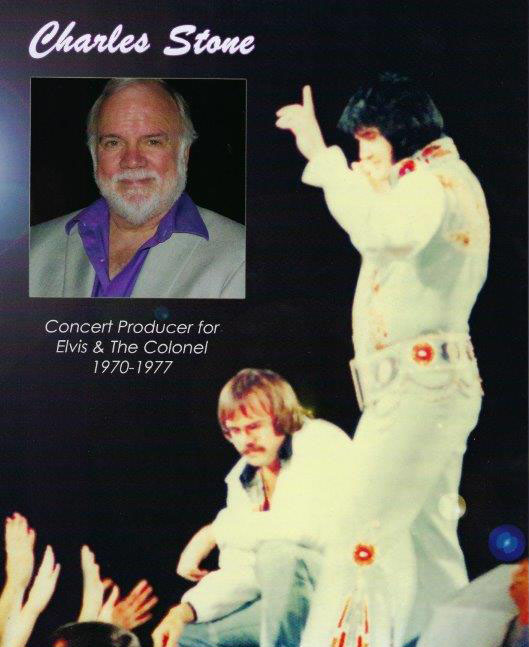
- Cast & crew
- User reviews
Elvis on Tour

Concert footage and offstage documentary of singer Elvis Presley. Concert footage and offstage documentary of singer Elvis Presley. Concert footage and offstage documentary of singer Elvis Presley.
- Robert Abel
- Pierre Adidge
- Elvis Presley
- Estell Brown
- 36 User reviews
- 20 Critic reviews

- Self - The Stamps
- (as Estelle Brown)

- (archive footage)

- (as Sylvia Shemwell)
- All cast & crew
- Production, box office & more at IMDbPro
More like this

Did you know
- Trivia Martin Scorsese was the montage supervisor for this documentary.
Elvis Presley : [introducing band members to audience] "... and the guy that gives me my water and my scarves and so forth, his name is Charlie Hodge."
- Alternate versions Due to music licensing issues, substitutions were made for the 2010 DVD/Blu-Ray release. The opening song, Johnny B. Goode is replaced with Don't be Cruel, while the Also Sprach Zarathustra (Theme from 2001: A Space Odyssey (1968) ) opening bars have been replaced with a generic piece of music.
- Connections Edited from Kissin' Cousins (1964)
- Soundtracks See See Rider Traditional, also credited to Ma Rainey Arranged by Elvis Presley Performed by Elvis Presley
User reviews 36
- CosmicDwellings
- Mar 1, 2004
- How long is Elvis on Tour? Powered by Alexa
- November 1, 1972 (United States)
- United States
- Elvis on Tour in Multiple-Screen
- Little Rock, Arkansas, USA
- Metro-Goldwyn-Mayer (MGM)
- Cinema Associates (III)
- See more company credits at IMDbPro
- $600,000 (estimated)
Technical specs
- Runtime 1 hour 33 minutes
Related news
Contribute to this page.

- See more gaps
- Learn more about contributing
More to explore

Recently viewed

IMAGES
COMMENTS
More than 40 years after his death, Elvis Presley remains one of the most famous and most easily recognized people in history. For the entirety of Presley's nearly 25-year career as "The King," his manager, "Colonel" Tom Parker, was the man who made all the career decisions. Frequently photographed with Presley, Parker became a celebrity in his ...
Honorary colonel ( Louisiana) Thomas Andrew Parker (born Andreas Cornelis van Kuijk; June 26, 1909 - January 21, 1997), [1] commonly known as Colonel Parker, was a Dutch-American musical entrepreneur. He was best known as the manager of Elvis Presley .
In 1963, Colonel Tom Parker, Elvis Presley's audacious manager who had gotten his start selling candy apples in carnivals, ... whose Wyatt Earp tour Parker promoted in 1957. O'Brian told me ...
The large figure of Elvis's manager, standing grinning just behind his charge, made Dankers-van Kuijk jump. The man had aged and grown grotesquely fat. But she still knew him as her long-lost ...
Elvis Presley had adoring fans all around the world, but the King of Rock and Roll's manager, Colonel Tom Parker, influenced his decisions when it came to touring internationally.
Elvis's first manager, Bob Neal, told me that he had a heck of a time getting stations to play Elvis's first single. ... since Elvis was so deeply unhappy about never getting to go tour Europe ...
Parker received more than half of the income from Elvis's early success, which at the time was an unprecedented figure for a music manager. The manager negotiated Elvis's expensive merchandising deals, TV appearances, and acting roles, but turned down offers to allow Elvis to tour overseas, potentially due to his status as an illegal immigrant ...
Parker continued to be Elvis's manager through the 1970s until The King's death in 1977, but he didn't see much of Presley in his later years. After Elvis died, the probate judge appointed a Memphis lawyer Blanchard Tual, whose report accused the Colonel of "self-dealing and overreaching" and of having "violated his duty to Elvis and the estate".
Linda and I are friends to this day. Linda's brother, Sam, had worked as a sheriff's deputy before he became Elvis's bodyguard in July 1976. Sam was a trusted friend of Elvis's, and the two men spent hours singing gospel songs together on tour. After Elvis's passing, Sam attended law school and became a very successful lawyer and judge.
When the Colonel and Elvis signed their first contract in August 1955, Bob Neal still had a contract as Elvis' manager. Parker initially signed on as "special adviser," and his duties were to "assist in any way possible the buildup of Elvis Presley as an artist." Parker was also given the right to negotiate renewals on all existing contracts.
Elvis Presley wasted no time winning over fans right from the beginning, thanks to his voice, energetic stage show, style, revolutionary sound and charm.But the music business is just that - a business - and every artist needs a manager to help take care of the details. From mapping out a tour route to arguing for higher appearance fees, the manager takes care of the business side of ...
Terrill said if Elvis had wanted to tour overseas, Colonel Parker would have handed the job off to tour manager Charlie Stone and likely remained behind working on the next deal.
He worked first as a tour manager for Grand Ole Opry stars Roy Acuff and Minnie Pearl. It was during this time that his friend, Louisiana governor Jimmie Davis, made him an honorary "Colonel." ... At the time of his death, Elvis had been searching for another manager. The Colonel continued to make money off Elvis for the next 20 years. When ...
Parker was a master promoter who wasted no time in furthering Presley's image. Colonel Parker managed Elvis Presley from 1955 until the singer's death in 1977. Prior to managing Presley, Parker helped transform Eddy Arnold into a country superstar with his own radio shows, movie roles, Las Vegas bookings, and an unparalleled resume of #1 records.
Adding authenticity to the touring tribute act is Parker's manager, Charles Stone, who from 1970-77 served as a tour manager for Elvis. Stone, a veteran tour manager who worked with several famous artists starting in the 1960s, spoke with the. News-Times about his past work with Presley, his entourage and his famous manager, Colonel Tom ...
About. Charles Stone, a veteran concert tour manager and producer started his career in the mid '60s working with all the major entertainers of the time. Charles joined forces with Elvis and the Colonel int he '70s and toured around America with Elvis and the Colonel, Taking Care of Business until Elvis' death in 1977.
Elvis on Tour is a 1972 American concert film starring Elvis Presley during his fifteen-city spring tour earlier that year. It is written, produced, ... Presley's manager, Colonel Tom Parker, then arranged a deal for another documentary film with the studio by early 1972.
Small town Australia and participatory "have a go" Australia was what animated the event. According to Elvis tribute artists — and Elvis's former tour manager, who made the trek from back ...
Elvis' manager told him he would lose everything after he fell and hit his head. In 1966, Elvis' friend, Joe Esposito, came to pick the singer up to go to the studio. He found him in the house ...
The only difference is Kraig Parker got his from living in Dallas, and Elvis Presley, the performer to whom he has paid tribute for the last 20 years, got his growing up in Mississippi and Memphis. ... Co-signed by Elvis Presley's tour manager, Kraig Parker brings tribute act to Coeur d'Alene Casino. By Azaria Podplesky. Published [hour ...
CHARLES STONE. As the tour producer for Elvis Presley throughout the 1970's, Charles Stone had the rare opportunity to be closely associated with both Elvis Presley and his manager, Colonel Tom Parker. Charles flew with Elvis and his associates on Elvis' personal plane, The Lisa Marie, from city to city each time Elvis went on tour.
Adding authenticity to the touring tribute act is Parker's manager, Charles Stone, who from 1970-77 served as a tour manager for Elvis. Stone, a veteran tour manager who worked with several famous ...
Elvis on Tour: Directed by Robert Abel, Pierre Adidge. With Elvis Presley, Bill Baize, Estell Brown, James Burton. Concert footage and offstage documentary of singer Elvis Presley.
Their numbers alone warranted a call-up before their actual promotion, but at the time, we heard general manager Ross Atkins and player development staff preach "routines." Martinez doesn't require language quite so vague, but his defense at second is a major factor as the Blue Jays look for the sweet spot.